Burnham - make fares a general election issue
Greater Manchester mayor wants more recognition of the huge societal benefits that public transport offers, and the case for providing subsidy
Greater Manchester mayor Andy Burnham has urged all political parties to make the cost of using public transport an issue at the next general election.
Speaking at this week’s Transport for the North annual conference in Newcastle, he said: “Public transport is too expensive to use at the moment. It can be cheaper for three or four people to get an Uber than it is to catch a bus. It can be cheaper to get a plane than it is to get a train. We’ve got to change that if we are going to go in the right direction as a country.”
Reducing fares would require increased public subsidy, but Burnham, an influential figure in
YOUNG WOMEN
EYE RAIL CAREERS
Train operator wants to encourage women to join
New research by LNER for International Women’s Day 2023 has revealed that a fifth of Gen Z women would love a career on the railway. Claire Ansley, customer experience and people team director at LNER, said: “We want to encourage as many women as possible to consider rail as an exciting... career choice.”
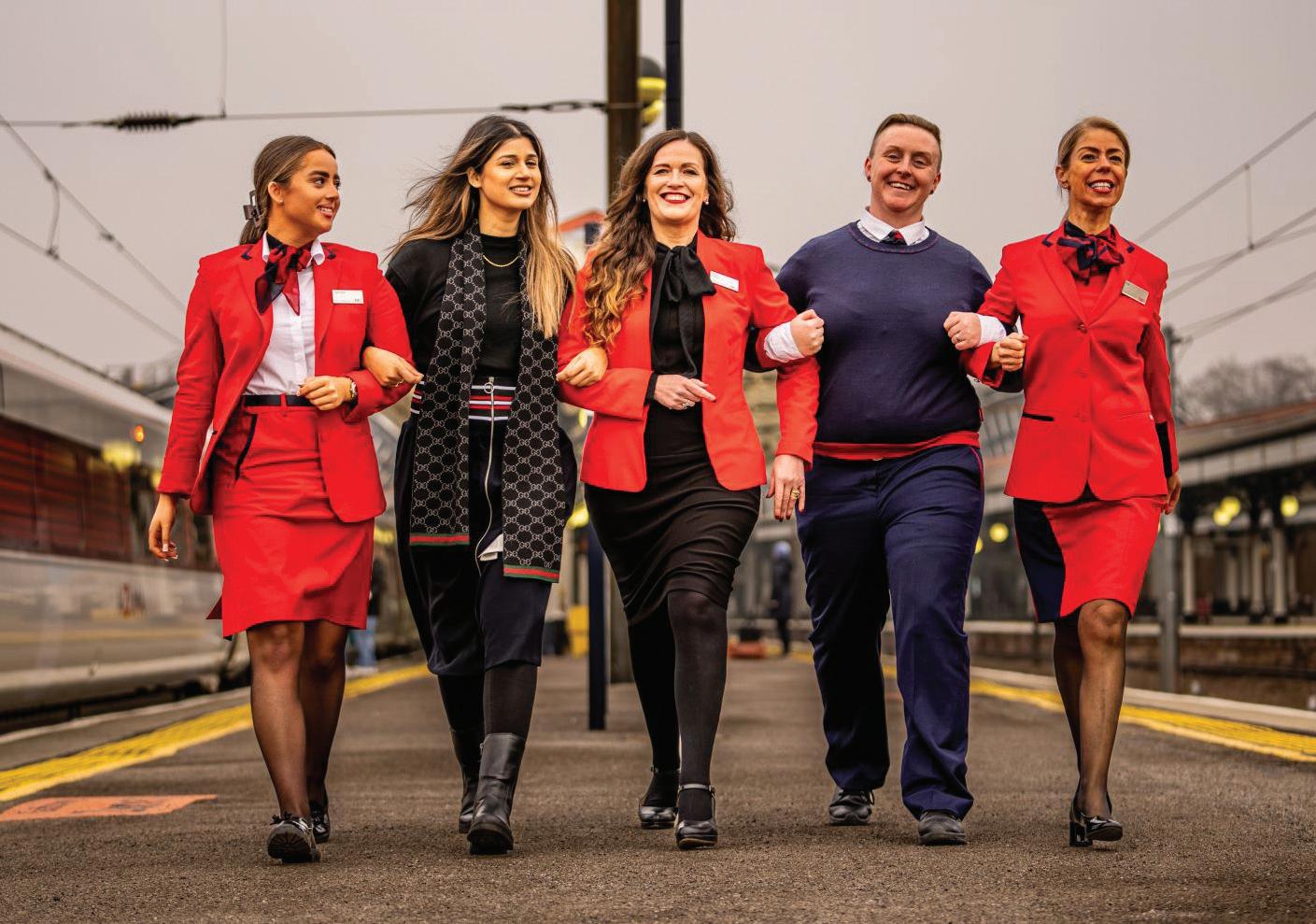
WOMEN IN PASSENGER
TRANSPORT: PAGES 22-26
Liverpool City Region pushes franchise plans
04
Combined authority members back plan
the Labour party and UK politics, believes this should be regarded as an investment. This approach underpinned the introduction of free bus travel for 16-18-year olds in Greater Manchester.
“Pretty much every other country in the world subsidises its cities when it comes to the public transport system,” he said.
“Outside of London we’ve been trying to run a no subsidy model
for decades actually under all governments and that just can’t work and it can’t continue.
“If you bring the cost of fares down you get so many benefits for people ... The societal benefits of low-cost public transport - I’m not even going to mention the climate benefits - are huge actually.
“It’s good that we’ve got a £2 cap on bus fares [in England] at the moment, but we need to see that principle made permanent.”
He pointed out that the German government will soon offer a 49 Euro (£44) transport ticket for city region travel, valid throughout the country.
MORE ON PAGE 05
First and Wrightbus gain ZEBRA funding
12
£25m helps purchase of 117 electric buses
Rail travelthe price is not right
14
Norman Baker says rebalancing is needed
The pros and cons of consultancy
16
Alex Warner urges fair play on all sides
284 10 MARCH 2023
ISSUE
NEWS, VIEWS AND ANALYSIS FOR A SECTOR ON THE MOVE
“Public transport is too expensive to use at the moment”
Andy Burnham
Embracing equality
in passenger
ENVIRONMENT NEWS COMMENT SPECIAL REPORT COMMENT
Advancing women
transport 22
EVERY FORTNIGHT
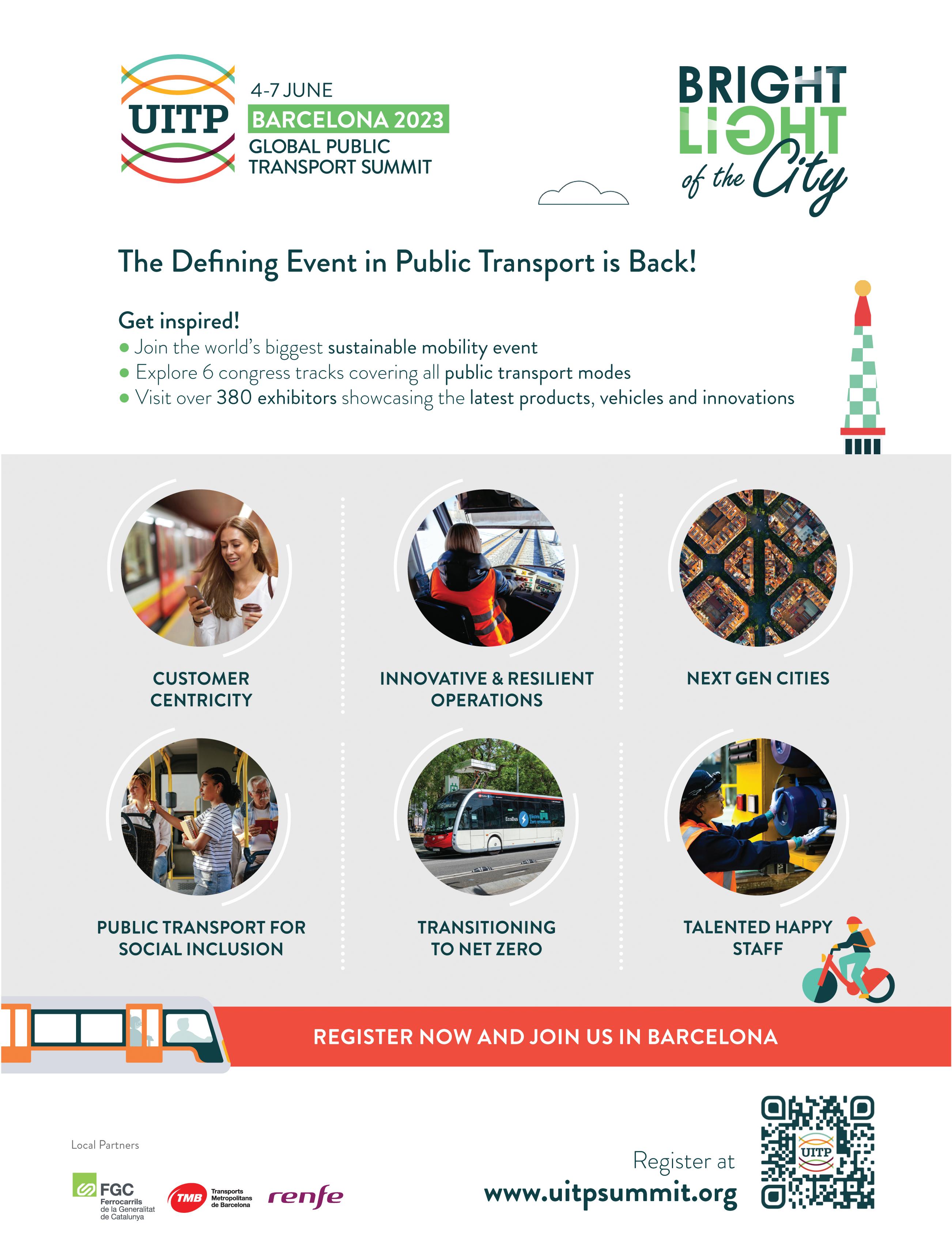
Car constraint is needed for new networks to thrive
IN THIS ISSUE
12
FIRST AND WRIGHTBUS GAIN Z EBRA F UNDING Fourlocaltransportauthoritiesin Englandhavebeenawardedashare of£25.3moffundingtosupportthe introductionof117additionalzeroemissionbuses.Thevehiclesinthis latestroundofZeroEmissionBuses RegionalAreas(ZEBRA)funding.
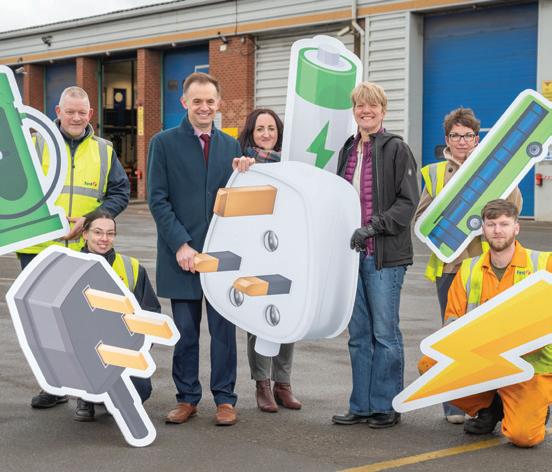
Manchester is a proud city that sees itself on the world stage, and Greater Manchester mayor Andy Burnham believes he is on the cusp of giving the city a transport network that matches that ambition. Less than two years from now, on January 5, 2025, the full Bee Network on trams, hire bikes and newly-franchised buses will be in place. “It’s going to be brilliant,” he told this week’s Transport for the North annual conference in Newcastle. “What we want to do is create a template that Liverpool, Leeds, Newcastle, Sheffield [can follow]. We want this to be something that can go right round the North.” Those who remain opposed to bus franchising will be disappointed. Greater Manchester might be the first to take advantage of the powers in the 2017 Bus Services Act, but it almost certainly won’t be the last. And if the result is a bigger role for buses as part of an integrated transport network that helps his region to thrive, Burnham will be applauded. By the mid-2040s, he expects all of the big cities of the North of England to have London-style integrated transport systems. But if levelling-up with London is the ambition, Burnham and his mayoral colleagues must be willing to constrain car use in the way that successive London mayors have done (red routes, roadspace reallocation, congestion charging, ULEZ etc) - but there was no talk of this at TfN’s conference. A hefty investment in carrots won’t have the same payback without the use of accompanying sticks.
Robert Jack Managing Editor
PASSENGER TRANSPORT editorial@passengertransport.co.uk
forename.surname@ passengertransport.co.uk
Telephone: 020 3950 8000
Managing Editor & Publisher
Robert Jack
Deputy Editor Andrew Garnett
Contributing Writer Rhodri Clark

Directors Chris Cheek, Andrew Garnett, Robert Jack
OFFICE CONTACT DETAILS
Passenger Transport Publishing Ltd PO Box 5496,
EDITORIAL editorial@passengertransport.co.uk
ADVERTISING ads@passengertransport.co.uk
SUBSCRIPTIONS
18
WE NEED ANSW ERS, NOT POLITICAL SNIPING MarkHarperusedtheGeorge BradshawAddresstoattackBritish RailandtheLabourParty,but John Nelson wonderswhereisthe legislativeprogramme?“MrHarper appearstobringprejudicetohis currentrole,”hesays.
20 U PRISING IN OX FORDCAN BUSES HELP?
Oxfordisexperimentingwithwaysof reducingtraffic,andasrecenthigh profileprotestsfuelledbysocialmedia haveshown,noteveryoneagrees. “Let’shopethatsensibledebatecan beextractedfromallthenonsense,” writes Nick Richardson
29
WHAT W ILL L ABOUR’S MISSIONS MEAN?
GreatMinsterGrumbles:OurWhitehall insiderimagineswhat’sgoingon insidethemindsofthemandarinsat GreatMinsterHouse,homeoftheDfT. ThereisarealprospectthatLabouris goingtoformthenextgovernmentwhataretheplansfortransport?
Westbury BA13 9BX, UNITED KINGDOM Telephone (all enquiries): 020 3950 8000
Passenger Transport is only available by subscription. Subscription rates per year; UK £140 (despatch by Royal Mail post); Worldwide (airmail) £280 The editor welcomes written contributions and photographs, which should be sent to the above address. All rights reserved. No part of this publication may be reproduced in whole or in part without the publisher’s written permission. Printed by Cambrian Printers Ltd, Stephens & George Print Group, Goat Mill Road, Dowlaid, Merthyr Tydfil CF48 3TD © Passenger Transport Publishing Ltd 2023 ISSN 2046-3278 SUBSCRIPTIONS HOTLINE 020 3950 8000 PASSENGER TRANSPORT PO Box 5496, Westbury BA13 9BX 020 3950 8000 editorial@passengertransport.co.uk CONTENTS www.passengertransport.co.uk 10 March 2023 | 03 ORGANISATION PAGE Abellio 9 ALSA 6 ArrivaMidlands 9 ArrivaNorthWest 9 ASLEF 7 AvantiWestCoast 10 BusUsersUK 9,30 CaledonianSleeper 7 Centrebus 9 CPTCymru 30 D&GBus 9 Fflecsi 11 FirstBus 12 HS2 7 LiverpoolCityRegion 4 LNER 1 LondonUnderground 7 NationalExpressGroup 6 NationalExpressWestMidlands 6 NationalRail 10 NetworkRail 7 RMT 6 StagecoachSouthEast 8 TransdevBlazefield 8 TransportFocus 9 TransportforGreaterManchester 5 TransportforLondon 5 TransportfortheNorth 1,4 TransportforWales 11 TransportforWalesRail 10 TransportforWestMidlands 7 TransPennineExpress 10 TransportUKGroup 9 Trentbarton 30 TSSA 7 Unite 6 WestMidlandsRailExecutive 7 Wrightbus 12
subs@passengertransport.co.uk ACCOUNTS accounts@passengertransport.co.uk
REGULARS
NEWS 04 ENVIRONMENT 12 COMMENT 14 OIL MARKET REPORT 28 GRUMBLES 29 CAREERS 30 DIVERSIONS 32 HAVE YOUR SAY Contact us with your news, views and opinion at: editorial@passengertransport.co.uk
It is proposed the first franchised bus services could commence in September 2026
Liverpool City Region pushes franchise plans
Combined authority members ratify plans by mayor Steve Rotheram to launch a consultation over the summer into plans to franchise region’s buses
REGULATION
Members of the Liverpool City Region Combined Authority last week approved a formal public consultation launch after May’s local elections that will probe plans to franchise the region’s bus services.
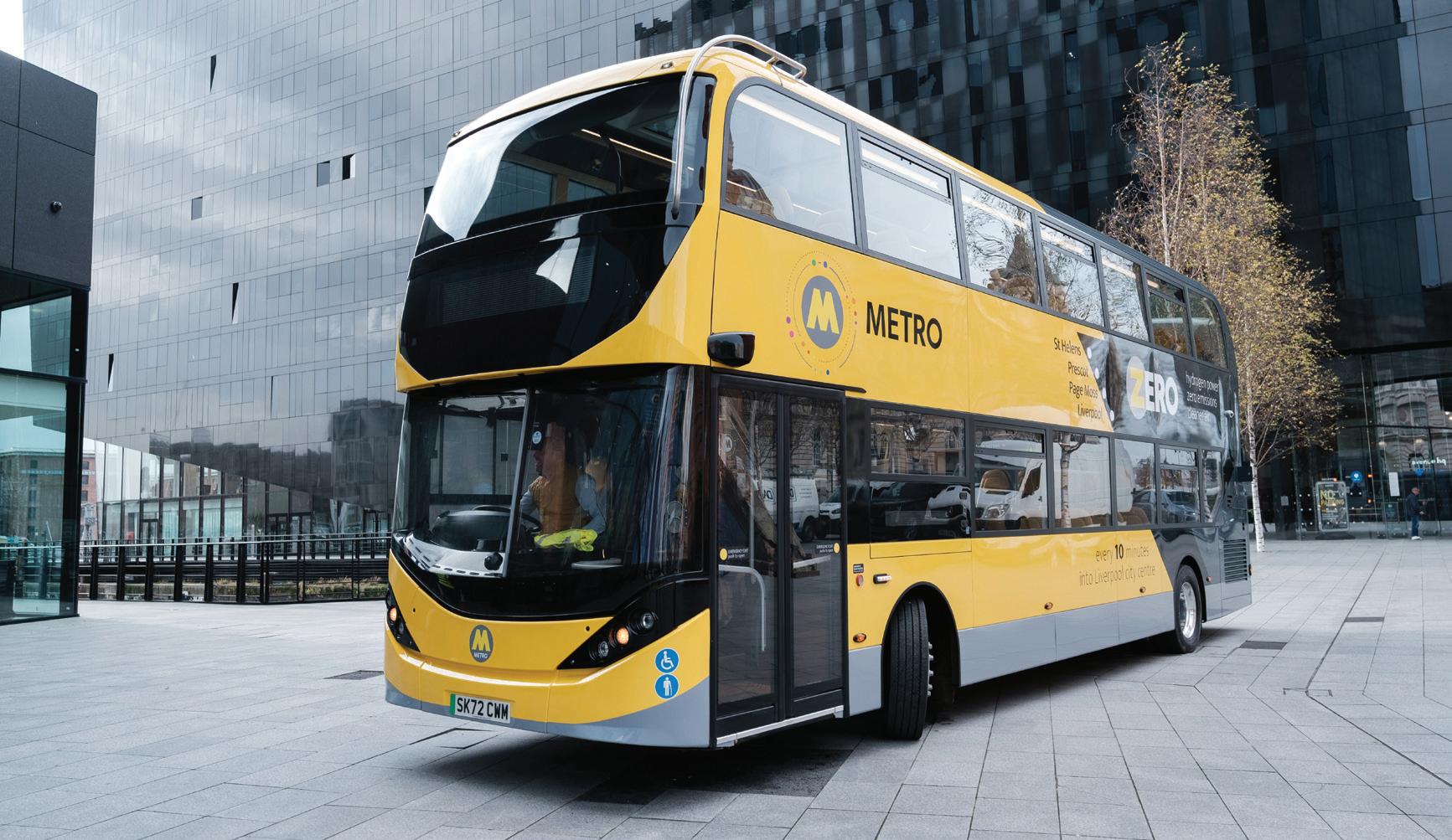
It follows last year’s vote by mayor Steve Rotheram and the combined authority to confirm franchising as the region’s preferred future model for bus service delivery.
Approval for the consultation followed the completion of an independent audit and assessment by consultant KPMG of the planned franchising model. Now, residents, businesses and trades unions will be asked to provide their feedback on the plans.
“For far too long, people in our communities have been forced to
contend with a second-class bus service that’s too confusing, too unreliable, and too expensive,” said Rotheram ahead of last week’s vote. “I want this to become a thing of the pastbecause we simply can no longer afford to accept a public transport service that leaves behind the very people who need it most.”
In a report to members, Richard McGuckin, the combined authority’s executive director for place, provided more detail on Rotheram’s plans.
He revealed that if the mayor decides to press ahead later this year, the first franchised services
would start in September 2026. McGuckin also confirmed there would be multiple contracts of varying sizes, including large depot-based contracts.
It is proposed that the whole of the region’s bus network would become part of the scheme at the same time. However, in a similar manner to Greater Manchester’s approach to franchising, contracts would be rolled out across multiple rounds.
Although an in-depth analysis of the planned scheme remains restricted to combined authority members for now, McGuckin did confirm the contracting process
would start with St Helens and then move on to Wirral, North Liverpool and Knowsley, South Liverpool, South Knowsley and Halton, and finally Sefton.
“The rationale for this approach would be to allow sufficient time for the franchise contracts to be procured and mobilisation to take place, as well time for the local bus industry to adapt smoothly to a new model of operation,” said McGuckin, adding the combined authority proposes at least nine months for the mobilisation period of each contract.
Although it would seem Greater Manchester has struggled to attract sufficient viable bids from smaller operators in its first round of franchising (PT280), McGuckin said the combined authority envisages a mix of contract sizes in order to give operators of all sizes the opportunity to bid for work.
He continued: “This would allow local small and medium operators the opportunity to continue to provide a similar level of service that they do in the current network, as well as opening the opportunity for expanding their services by bidding for multiple contracts.”
McGuckin also confirmed that on completion of mobilisation of these contracts, all bus services in the region would be operated as part of the franchised network. However, it seems there would still be opportunities for third party operators to continue services using a London-style service permit if exempted from the scheme entirely.
It is anticipated the combined authority will take the final decision on whether to implement a franchising scheme or pursue a partnership option later this year. If franchising is chosen, then the scheme would be ‘made’ at that point.
NEWS ROUND-UP 04 | 10 March 2023 www.passengertransport.co.uk
“For far too long, people in our communities have been forced to contend with a second-class bus service”
‘Transform the North to level up the UK’
Transport for the North held its annual conference this week
NORTH OF ENGLAND
Transport for the North’s fourth annual conference took place in Newcastle this week as new figures reveal the northern economy could produce one million extra jobs by 2050.
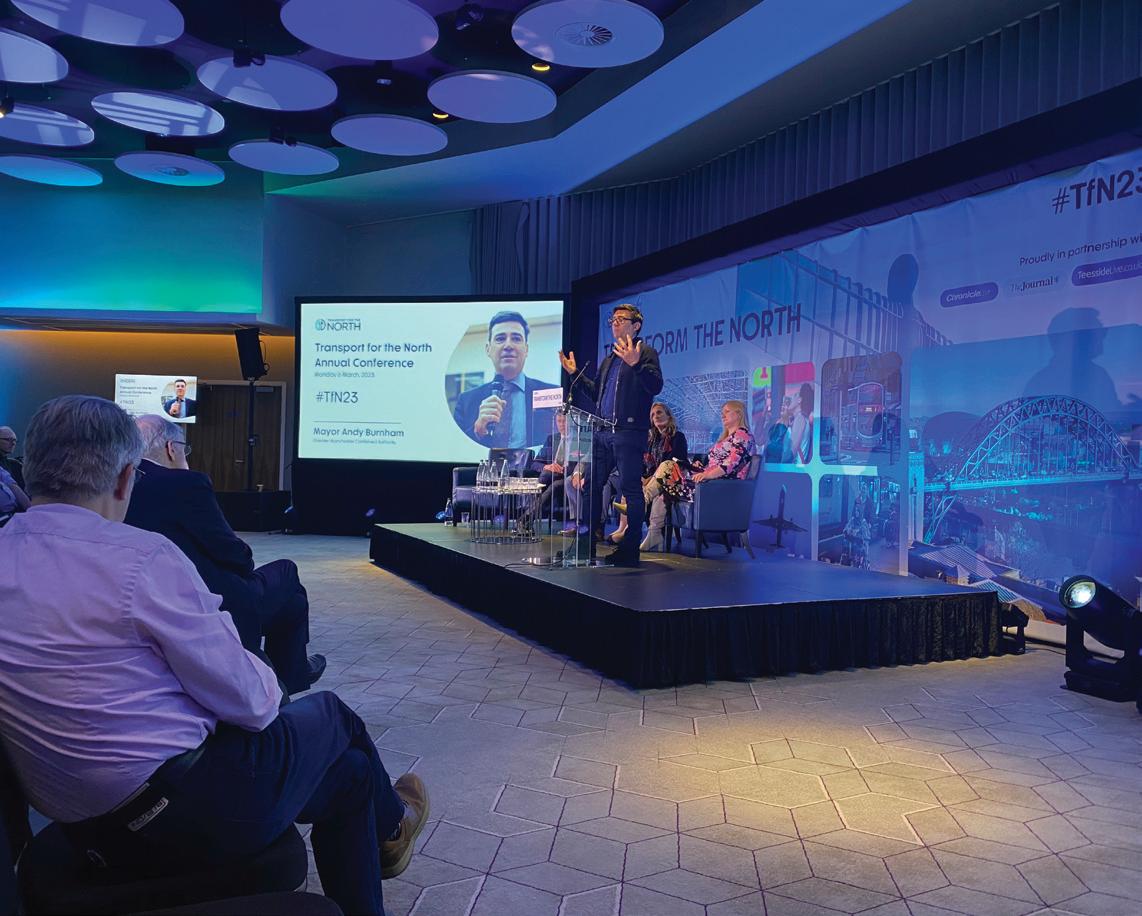
Under the theme of ‘Transform the North’ TfN’s conference revealed the initial findings from its updated Northern Powerhouse Independent Economic Review (NPIER). The review examines how poor investment in infrastructure is currently holding back the Northern economy and how it could be refitted to help power the UK economy in the decades ahead.
The key findings are that weak productivity growth in the North since the global financial crisis is estimated to be costing the economy £100bn GVA pa. But if the North is transformed through investment across a range of policy areas it could add an additional £118bn GVA per annum and one million extra jobs by 2050. Average earnings could be over 25% higher than today, adding around £10k to the average wages in 2019 prices.
Lord McLoughlin, chair of Transport for the North said: “The challenge to rebalance the UK economy is a work in progress. To achieve this we must transform the North of England’s economy.
“TfN over the course of this year will be setting out plans on how we can realise the North’s economic potential through our refreshed Strategic Transport
Plan. But as we can start to see as we update the Northern Powerhouse Independent Economic Review, it will take long-term patient investment of scale to close this gap.
“These initial findings produced by TfN as part of our NPIER, to be published later this year, reveals that the longer we wait to grasp the nettle, the harder and more costly it will be to level up the North. But the evidence also shows the huge reward for our country if we do rise to the challenge and transform the North, harnessing the power of both public and private sectors to make a difference for the North’s businesses and communities.”
Addressing the conference, shadow transport secretary
Louise Haigh said that a Labour government would back the transformation of transport in the North, including the delivery of HS2 and Northern Powerhouse Rail in full.
Later in the day, transport secretary Mark Harper was asked how much damage had been done to the Conservative party’s reputation in the North as a result of the decision not to go ahead with the eastern leg of HS2 and the full Northern Powerhouse Rail project. He responded: “We have to be straight with people about paying for things. People who come along to conferences like this and pretend, with no means of paying for it, that they are going to do things to get a clap aren’t being straight
with you ... My job is to deliver good passenger services, increase capacity on the railway, but it’s also to look out for the taxpayer who has to pay for all of this.”
He was similarly dismissive of the suggestion that the government’s £27bn road building budget conflicted with its commitment to achieving Net Zero. “We are decarbonising the vehicles that travel on those roads,” he said, adding that once the vehicles are zero emission there is “no problem with them having more roads to travel on”.
Earlier in the day, Jamie Driscoll, mayor for the North of Tyne region, made the case for modal shift away from private cars and towards public transport. He revealed that citizens in the expanded area of the North East devolution deal spend around £3bn a year on owning and running private cars - about £1,500 per head. “This is literally costing the earth,” he said. He argued that bus franchising might be expensive, but will cost a lot less than this.
Greater Manchester mayor Andy Burnham is introducing bus franchising as part of his Bee Network vision. He is lobbying the government to include control of rail routes as part of a new devolution deal, so that people in Southport or Buxton can travel into Greater Manchester and enjoy an integrated transport offering with a capped daily cost.
“That would give people in those places a real reason to leave the car at home and get on public transport ... London’s got TfL Overground, well we want TfGM Overground ... And we hope that we can land that because if we do we can have a Bee Network by the end of this decade that is bike, bus tram and train and imagine how much of a game changer that would be for the north of England.”
www.passengertransport.co.uk 10 March 2023 | 05
“The longer we wait to grasp the nettle, the harder and more costly it will be to level up the North”
Lord McLoughlin, Transport for the North
Andy Burnham told the conference: ‘London’s got TfL Overground, well we want TfGM Overground’
NEG profits rebound after strike windfall
Industrial unrest on railways helps boost group’s annual profits
FINANCIALS
Industrial unrest on Britain’s railways has led to a robust set of results for the year ending December 31, 2022 at National Express Group (NEG).
The group reported underlying pre-tax profits of £145.9m, up from £39.7m in 2021, with annual revenues surpassing pre-pandemic levels for the first time since the onslaught of Covid-19.
Revenues at the London-based group also leapt to a record £2.8bn, higher than 2019 levels and a more than 24% increase on 2021 on a constant currency basis. Much of this was driven by strong patronage growth across the group’s operations in Spain, Morocco, the UK and Germany and this strengthened further in the second half of the year.
The group’s ALSA division
delivered record revenues, exceeding revenues in excess of one billion Euros for the first time. The group claimed that diversification of the ALSA business, away from so-called ‘long haul’ express coach operations into regional and local bus contracts was beginning to pay-off. During the year the group mobilised its first urban bus contract in Portugal and expanded elsewhere.
In North America, school bus revenue grew by 8%, despite industry-wide driver shortages which slowed the rate of route recovery. Meanwhile, revenue at the North American shuttle operations also grew by 21%. Transit operations were broadly
stable.
In the UK, the express coach business experienced very strong growth in demand after the near complete network closure in the early part of 2022 as a result of the Omicron Covid-19 variant.
Since then coach revenue has more than doubled, driven by the reopening of international travel leading to a surge in airport services and strong intercity demand.
The group revealed that a relaunch of the network had also achieved a 6% reduction in costs per passenger mile and bringing UK coach operations under a single management team had allowed capacity from the non-scheduled National Express Transport Solutions business to be deployed on the scheduled network in periods of high demand.
The West Midlands bus operation has also seen a continuing recovery in demand,
Drivers plan all-out continuous strike
Group is ‘sitting on mountains of cash’, claims Unite
More than 3,000 National Express West Midlands drivers have voted overwhelmingly to strike over pay with all-out continuous strike action set to commence from March 16.
The Unite union said members voted 96% in favour of industrial action, on a turnout of 72%. They will be joined by over 200 engineers who voted for
industrial action over pay in January, bringing the total number of striking workers to more than 3,300.
Pointing to the group’s robust annual results for the year ending December 31, 2022, which were announced this week, Unite general secretary Sharon Graham claimed parent company NEG was “sitting on mountains of cash
and can absolutely afford to give a pay rise to its staff that reflects rocketing living costs”. “It needs to do just that,” she added.
NXWM said the results of the ballot were disappointing.
“Since the ballot, we have offered the union a pay deal for drivers worth 13.4% made up of 11.1% for 2023 and a retention payment worth 2.3%,” said a spokesperson.
“This is on top of 6% our drivers received in November. This will see the majority of drivers earn over £30,000.”
with commercial passenger journeys up 39% year-on-year. The group also revealed that well over 80% of passengers now board with a digital ticket of some description which allows it to the “to leverage the resulting data to build future demand”.
In Germany NEG is now the second largest rail operator in the German federal state of North Rhine-Westphalia and within the top five private operators in Germany. Revenues grew 49% with the emergency award of two contracts formerly operated by Abellio’s financially troubled German operation at the start of the year delivering an additional Euros 100m of annualised revenue.
“After a first quarter that was impacted by Omicron, the resilience and agility of our teams amid a uniquely challenging operating environment meant we saw momentum build across our businesses through the year and continue into 2023,” said chief executive Ignacio Garat.
“Whilst the operating backdrop remains challenging, with inflationary pressures continuing in key markets, we expect to see that momentum continue, driven by growth in passenger numbers, mobilisation of new contracts, a continuing recovery in US school bus and the securing of rate increases during 2023 and 2024 allowing us to recover cost increases.”
Garat said that expectations for FY2023 are unchanged and “clear and robust actions” have been put in place to mitigate macroeconomic headwinds and to reduce costs if necessary.
“The continued and expanding demand for public transport over the coming years will bring growth opportunities and our Evolve strategy positions us well to capitalise on them,” he added.
“We saw momentum build across our businesses”
NEWS ROUND-UP 06 | 10 March 2022 www.passengertransport.co.uk
We need answers, not political sniping.
Page 18
RMT strike scrapped after improved offer
Union to ballot members on revised Network Rail offer
INDUSTRIAL RELATIONS
There is growing optimism that there may have been a breakthrough that could end the RMT’s long-running strike action that has crippled the rail network in recent months.
It follows the announcement that the union had called off some of its planned action after it announced it would put a revised pay offer from Network Rail to members there. It had planned a 24-hour strike amongst members on March 16, and the union has also cancelled a planned overtime ban that could have led to disruption on non-strike days.
The union’s general secretary Mick Lynch said in a message to members that the RMT had received “an improved offer” from the infrastructure controller.
The union claimed the new
offer involves extra money and is not conditional on accepting Network Rail’s modernising maintenance agenda which RMT does not endorse.
The offer amounts to an uplift on salaries of between 14.4% for the lowest paid grades to 9.2% for the highest. There is an additional 1.1% on basic earnings and increased backpay. The offer also has a total uplift on basic earnings between 15.2% for the lowest paid grades to 10.3% for the highest paid grades.
The increased backpay will be implemented and paid as a lump sum. The improved offer also involves pulling forward the pay anniversary to October 2022 from January 2023.
Network Rail had previously offered a 9% pay rise over two years, tied to major reforms, which the RMT rejected.
The rail industry has welcomed the potential breakthrough, although the Rail Delivery Group
Tube drivers to strike in further dispute
ASLEF members announce 24 hours strike on March 15
INDUSTRIAL RELATIONS
In a further new industrial dispute, ASLEF members on the London Underground network will strike for 24 hours on March 15 over what the union claims is “management’s failure to accept that changes to our working arrangements and pensions should only happen by agreement”.
Tube train drivers voted by 99% in favour of strike action on a turnout out of 77%. Meanwhile, ASLEF members in other roles at London Underground, including test train and engineering train drivers and those in management grades, also voted in favour of strikes by similar margins and will walk out on the same day.
“We understand that TfL faces
demanded the union ballot members in train operators who have been made the same offer in a separate dispute.
“The RMT leadership’s decision to put Network Rail’s deal to its membership is a welcome development, but train operating staff will rightly be asking why their union continues to deny them the opportunity to have their say on our equivalent offer,” said a spokesperson.
“Instead of inflicting more lost pay on its members and disruption to our passengers, we are calling on the union to call off their strikes and meet us for urgent talks.”
Train drivers, represented by ASLEF are involved in a separate dispute with train companies but have set no new strike dates with negotiations continuing. Meanwhile, members of the TSSA union have now accepted the offer the RMT had previously rejected.
IN BRIEF
NEW STATIONS PLAN
Transport for West Midlands and the West Midlands Rail Executive are to explore the feasibility and business cases for five new railway stations across the region. The five proposed stations: Balsall Heath, Coventry East (Binley), Foleshill, Castle Bromwich and Tettenhall have been selected from a long list of 15 following an initial feasibility study. They were identified as those with the strongest case for development first.
It follows the award of funding from the West Midlands City Region Sustainable Transport Settlement (CRSTS) to investigate and plan the next phase of station development. Once complete these business cases could be used to secure further government funding to design and build the new stations.
MILESTONE FOR HS2 TUNNEL
financial challenges, postpandemic, but our members are simply not prepared to pay the price for the government’s failure to properly fund London’s public transport system,” said Finn Brennan, ASLEF’s full-time organiser on the Underground.
“Unless they are prepared to work with us, and accept that changes have to come by agreement, and bring real benefits to staff, rather than just cuts and cost savings, this will be only the first day of action in a protracted dispute.”
HS2 has confirmed that the two tunnelling machines digging the high speed rail route’s longest tunnels have passed Amersham, five-and-a-half miles into their 10 mile drive under the Chilterns. Designed specifically for the geology of the Chilterns, the first TBMs were launched in Summer 2021 from a site near the M25 motorway and have excavated more than 1.8 million cubic metres of chalk and flint.
SLEEPER NATIONALISATION
Scottish transport minister Jenny Gilruth has announced that management of the Caledonian Sleeper will pass to an arms-length company owned by the Scottish Government on June 25 when the present contract with operator Serco ends. Staff will transfer to the operator with their terms and conditions protected.
www.passengertransport.co.uk 10 March 2022 | 07
Hornby is away amid challenges for Transdev
Chief executive away as operator reports big losses for 2021
OPERATORS
Alex Hornby has stepped aside from his role as chief executive of Harrogate-based bus operator Transdev Blazefield.

An out of office email from Hornby stated that he would “be away from the business for several weeks to deal with a personal matter” and it directed correspondents to his fellow directors for a response. Although sources within the business had been approached for comment, none had arrived as Passenger Transport closed for press.
Hornby’s departure follows a difficult few months for the operator which appears to have struggled to recover from the effects of the Covid-19 pandemic. Transdev Blazefield was late in filing its accounts for the year ending December 31, 2021, which were finally lodged
FRUSTRATION AT KENT ROADWORKS
Stagecoach boss calls for collaborative working
CONGESTION
The managing director of Stagecoach’s bus business in the south east of England has called for more “joined-up thinking and teamwork” between operators and highways authorities.
In a blog post on the operator’s website, Joel Mitchell, who joined the operator in 2019 after a career in the rail industry, expressed increasing frustration at roadworks across Kent
with Companies House in early January. They were signed off just before Christmas.
They reveal that while turnover rose to £81.6m for the year (2020: £55.3m), operating losses were £2.3m (2020: £0.4m) and after finance costs the loss before tax was £2.9m (2020: £1.1m).
The accompanying directors’ report notes that UK bus market conditions “remain challenging” and that operating losses at the business had increased “due to recovery from the impact of the
Covid-19 pandemic”.
Recent months have seen Transdev Blazefield take action to mitigate these effects with efforts to cut and contain costs. These have included the withdrawal of numerous services, including a significant number of tendered services operated on behalf of a number of local authorities in Lancashire and Yorkshire.
Plans to axe the high profile Yorkshire Coastliner 840 service between Leeds, York and Whitby from early April were withdrawn at the end of February after the government confirmed further funding to support buses.
A further review of the route’s performance will take place in early Autumn, as the operator works with North Yorkshire County Council to plan for the longer term.
“The Coastliner 840’s longer term future will naturally depend on how it performs beyond the end of June, but we are hoping that customers who discover what
an amazing journey it is will want to experience it again, and by doing so, helping to secure it for everyone to enjoy,” said Transdev Blazefield commercial director Paul Turner in a statement. Meanwhile, the operator has announced it is introducing a new bus sponsorship offer following a successful partnership with retailer John Lewis on the high profile Route 36 service between Ripon, Harrogate and Leeds and Coastliner services.
Transdev Blazefield said the new approach “is about more than simple advertising, as sponsoring a bus opens the door to further opportunities to promote local business to a far wider audience than a traditional static billboard”.
“John Lewis instantly saw the unique advantage in linking their brand with ours, and now their name can be seen across miles of town and country, inviting potential customers to hop on a bus and be chauffeur driven to the door of their store,” said Matt Burley, Transdev Blazefield commercial manager. “We believe bus sponsorship is a formula for business success for firms throughout our region.”
that were creating an increasing number of delays for bus passengers. Pointing to research that suggested the key priorities for bus users were services that are on time and reliable, Mitchell said the operator had taken steps in recent years to make that a key priority with the creation of a service delivery support team to help plan around scheduled works and improve engagement with stakeholders.
“Of course, as a bus operator we have experience of dealing with dayto-day problems that can affect our schedules - but what we’re seeing recently in Kent is off the scale,”
he said, pointing to a litany of road closures and traffic control measures that were affecting the viability of services and damaging frequencies.
“I miss the joined-up thinking and teamwork in the rail industry; where the infrastructure owner and train operators talk together in advance of planned disruption and think about the customer.
“Our timetables are our promise to our customers, and if we can’t deliver on them, people will lose faith in bus travel as a service they can trust... We urgently need change from a highways free-for-all culture that generates cost and disruption in our
lives, to a joined-up, regulated and properly controlled process in which all stakeholders participate.”
Mitchell pointed to some planned roadworks in Kent where a compromise solution had been discussed and agreed in advance. These talks had meant that the villages that would have been potentially disrupted were able to continue to benefit from an uninterrupted bus service. More recently, peak-time buses were given passage through a road closure at another site in the county.
“Come on Kent - we can do so much better,” he concluded.
NEWS ROUND-UP 08 | 10 March 2023 www.passengertransport.co.uk
Hornby: Personal reasons cited for absence
Arriva steps back with further network cuts
Operations in Cheshire and Shropshire see further retrenchment
NETWORKS
In further retrenchment for the German-owned group, Arriva has announced it is consulting with staff to close three depots in Cheshire and Shropshire.
The plans could see Arriva North West depots in Macclesfield and Winsford, which the operator claims have been lossmaking since before the Covid-19 pandemic, and Arriva Midlands’ Oswestry base closed.
Closure of the Cheshire operations would see Arriva withdraw entirely from Winsford, Northwich, Crewe and Macclesfield. Arriva North West added in a statement that it had “undertaken extensive
actions to try and turn around these challenges”, including the introduction of a revised network in November 2021. “Unfortunately these steps have not delivered the required improvement,” it added.
“Arriva North West has worked closely with Cheshire East and Cheshire West councils to explore all options to avoid closures but regretfully has not been able to find a way forward to return the depots to a financially sustainable position.”
Centrebus subsidiary D&G Bus used Arriva’s announcement to register a handful of Winsford routes. David Brookes, the operator’s commercial director, said D&G Bus intended to step in and cover as much of Arriva’s network as possible.
“There are some services we
haven’t registered but we will be speaking to local council officers to see what else we can do to help,” he added. “We can’t guarantee we can cover all the Arriva routes but we’ll make every effort to keep local buses moving in the area.”
Meanwhile, Arriva Midlands said that the Oswestry operation has been hampered by poor patronage recovery following the pandemic. It claimed passenger numbers are just 54% of what they were before the onset of Covid-19.
“This post-pandemic recovery is far below national trends and comes alongside a challenging combination of significant industry-wide cost inflation and funding support from the local authority falling significantly below the levels provided by other councils,” added the company.
BUS USERS AUDIT
Bus Users UK is calling on operators to take part in this year’s survey of transport accessibility. The annual snapshot aims to highlight best practice, innovation and encourage operators to think more inclusively when planning and designing services. The audit will be live throughout March and you can contribute online at forms.gle/vRpFjQ8hmUSWGo1y6
DCPC REFORMS MOOTED
The government has launched a consultation into proposals to reform the Driver Certificate of Professional Competence (DCPC). The move aims to explore how to best improve DCPC to increase flexibility and choice for drivers to help safeguard road safety, and support the industry in retaining and recruiting staff. Proposals include more flexible e-learning options and shorter periodic tests.
SMITH TO STEP DOWN
TRANSPORT
UK BUYS ABELLIO
Management completes purchase from NS
ACQUISITIONS
Confirmation came last week that the management buyout of Abellio’s UK operations from Dutch shareholder Nederlandse Spoorwegen has completed after receiving regulatory approval.
The acquisition, which was announced last summer (PT271), will see a new company, Transport UK Group Ltd (TUK), take over all Abellio UK’s existing operations. The new owners have confirmed the Abellio brand will remain in operation for parts of the business, including the group’s London bus operation.
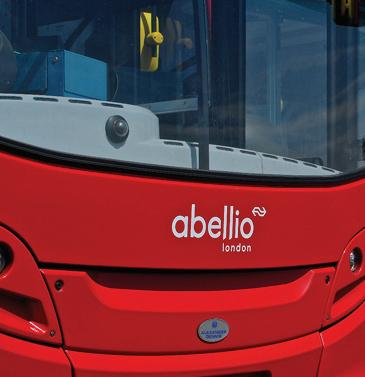
The purchase has been led by
respected Abellio UK managing director Dominic Booth. He is understood to own the majority of the new TUK business with chief operating officer Alan Pilbeam joining him as a director of the new enterprise.
In a statement, TUK said it was committed to playing “a vital, longterm role in the future of UK rail and bus services, ensuring that it delivers on passenger needs and provides a sustainable, safe, and reliable travel experience”.
The group continued: “The company will also continue to provide its voice and extensive knowledge to help shape the debate on UK rail industry reform, focusing on driving innovation and working with all governmental and industry bodies to shape and implement
a future-ready, low-emission UK transport network.”
Booth added he was “thrilled” to return key public transport service back into UK ownership.
“While our name will change to Transport UK Group, our values remain the same,” he said. “We will continue to play a key role in the country’s transport sector.”
Transport Focus has announced that chief executive Anthony Smith will step down at the end of the year. He has been with the organisation and its predecessor for almost 25 years. Prior to that Smith was deputy and acting director of ICSTIS, the regulator of premium rate telephone services.
“This has been a very personal decision but it is time the organisation had some fresh leadership,” Smith said. “I’m proud to have been part of the evolution and development of Transport Focus, working with the fantastic team here to make sure transport users’ voice is kept at the heart of decision-making.”
Transport Focus chair Nigel Stevens said Smith was leaving the watchdog in a strong position.
Abellio name will remain for some of TUK’s operations
IN BRIEF www.passengertransport.co.uk 10 March 2023 | 09 Uprising in Oxford - can buses help?
Page 20
Patronage data hints at off-peak resilience
New figures suggest that off-peak rail travel, particularly at weekends, is outperforming private car use and higher than in 2019 in some cases
PATRONAGE
National Rail services have been outperforming the private car on many days this year in Department for Transport statistics that compare with pre-pandemic use. One train operator told Passenger Transport that while demand in the morning peak remains well below 2019 levels, this is balanced by stronger demand over the rest of the day being similar or sometimes higher than in 2019.
The DfT publishes statistics of daily transport use by mode, showing the journeys made as a percentage of those on the equivalent day in 2019. From January 14 to January 31 this year, the percentage of National Rail journeys was higher than the percentage of car journeys on every day except 29 January, when the two were equal on 95%.
Buses have managed the same feat on some days this year. For example, buses outside Greater London registered 100% on Sundays February 5 and 12 compared with 98% and 97% for car, while London buses registered 118% and 104% on those days. However, National Rail demand fluctuates, with the impact of strikes being particularly noticeable in the data. After the run of Christmas and New Year strikes ended on 12 January, the following strike occurred on 1 February. On every day from 14 to 31 January, National Rail recorded at least 90% of the 2019 passenger journeys, peaking at 98% on
Sunday 15 January.
In the seven days before the strike on 1 February, National Rail’s daily figures were either 94% or 95%. However, on 1 February they dropped to 89%, and subsequently to below 80%.
Trends in passenger demand were discussed at a recent Transport for Wales Rail board meeting. TfW Rail told Passenger Transport the general trend in the DfT statistics was consistent with Wales and Borders passenger demand, which on some days was at or above pre-Covid levels over recent months, although on average demand remained below the pre-Covid position.
“We have seen a general reduction in traditional morning peak demand since Covid, with the morning peak far reduced, however evening peak demand has now recovered more closely towards the pre-Covid position,” said TfW Rail. “Further to this, demand in the inter-peak and post-evening peak period is now
often above pre-Covid demand levels.”
Chris Cheek, editor of Passenger Transport Monitor, said many things were feeding into the rail demand situation. “It makes you wonder where we would be if we weren’t having a strike every other week,” he commented.
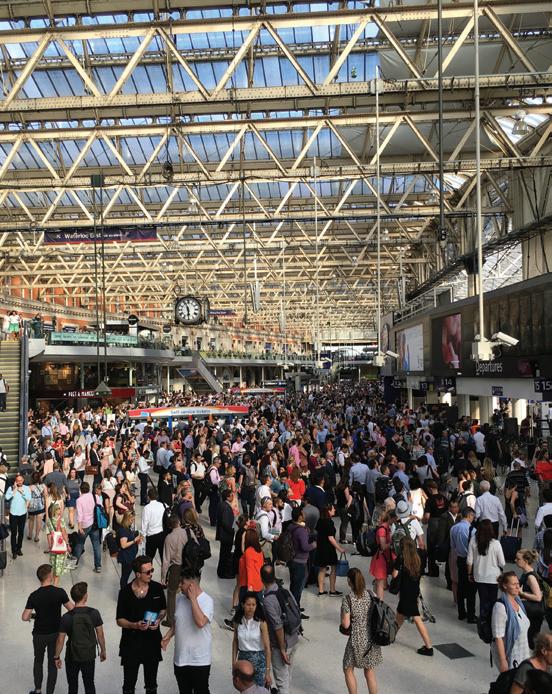
While there had been much reporting of poor quality of service by some operators, such as Avanti West Coast and TransPennine Express, for many passengers the journey by rail was good and in many cases better than before Covid-19, with many new trains having been introduced since 2019 and Pacers withdrawn. Even in the north of England, the main focus of recent dissatisfaction, Northern’s new trains had transformed the ride on routes such as Manchester to Blackpool, Cheek said.
The high cost of petrol and diesel had also played into rail’s hands. There were many days last year and in 2021 when car journeys were at least 100% of the numbers in 2019, but none so far this year.
“Rail is generally faster and there are certain journeys where the traffic is so horrendous you wouldn’t do it [by car],” Cheek said. Many cities had become more aligned to walking and cycling since 2019, and parking became difficult in many city centres before then.
“People’s attitudes are changing,” he said. “Young people are much more environmentally
aware and much more likely to change or modify their behaviour to reflect that.” Car affordability, starting with driving lessons, was also an issue for many young people. “If they can afford the car, they can’t afford to insure it.”
The DfT’s statistics are not a purely like-for-life comparison with 2019, because the National Rail statistics include the central section of the Elizabeth Line, which had not opened in 2019. Trains using the new infrastructure have been used for many millions of passenger journeys, but a proportion of those journeys would have been made in 2019 on National Rail services to stations such as Paddington or Liverpool Street.
Commenting on TfW Rail’s experience of the balance of demand tipping away from the morning peak and towards the evening, Cheek said this was consistent with what London and the South East was witnessing before the pandemic. Recalling a journey from London to Croydon before Covid-19, he said: “I was staggered by the number of people at London Bridge at 9pm.”
Since Covid-19, it was likely that on days when people did commute to workplaces, they were going in later in the day and staying later. “That’s a very middle class thing, but most rail passengers are middle class anyway.” However, he said some professions, such as medical and educational, were still working more traditional hours.
Rail and bus had benefitted from leisure travel since the pandemic, and Cheek evidenced a journey he had made from Sussex to London on a recent Saturday morning on an eight-car train, the same length as before Covid-19.
“The train had a seated load leaving Lewes, so by the time we left Gatwick it was crammed.”
NEWS ROUND-UP 10 | 10 March 2023 www.passengertransport.co.uk
There is strong demand for offpeak rail use
Denbigh Fflecsi DRT scheme to expand
Introduction of second service follows 2020 launch of pilots
DRT
One of the star performers of the Fflecsi-branded collection of Demand Responsive Transport (DRT) services in Wales will be expanded next month to include a wider operating territory and a second vehicle.

Denbighshire County Council introduced Fflecsi 66 in August 2020 to replace the Denbigh town service and take public transport into parts of the historic town where no buses previously operated. Buoyed by its experiences with Fflecsi there and in Prestatyn and Ruthin, the authority will introduce Fflecsi 77 on April 11, centred on Denbigh but covering outlying villages as far away as St Asaph.
Transport for Wales (TfW) created the Fflecsi branding, app and call centre in 2020 for four Fflecsi pilots, in Newport, Blaenau Gwent, Conwy and Pembrokeshire. Denbighshire was one of several councils which launched their own pilots. They did not face the complications and costs of establishing bespoke booking systems because TfW had a ready-made one available.
TfW regards Denbigh as a rural Fflecsi exemplar. Fflecsi 66 requires one driver and one shift per day. This is the same resourcing as was needed for the previous town service and the operating hours are similar, but more people now have access to a service later in the day. Previously the later journeys covered only certain parts of the Denbigh town network.
Passenger Transport asked TfW for evidence that Fflecsi had drawn in new users. “Comparisons are difficult because of the health emergency and its continuing longer term effect, but we have undertaken qualitative research to suggest that there are new users,” replied TfW. “The app statistics indicate new users, as well.”
Monthly passenger numbers increased steadily from 1,308 in July 2022 to 1,421 in both October and November, then reduced to 1,382 in December and 1,231 in January. Over the same period, the overall average number of passengers per hour has fluctuated from 7.6 in July to a peak of 8.2 in October, reducing to 7.0 in January.
DRT has come and gone in many areas of Britain over the last 20 years, sometimes falling by the wayside when the initial funding has reduced or dried up - perhaps in tandem with politicians’ interest. Transport for Wales is unable to say how Denbigh Fflecsi’s subsidy compares with that of its predecessor, because the current contract was awarded in 2021 in combination with
a contract for other services. However, the subsidy for the package was about 5% lower than the previous one, despite including a new Optare Solo to operate alongside the Sprinter used for Fflecsi 66.
TfW’s Newport Fflecsi pilot, which ended in September, suffered a number of drawbacks, including many ‘no shows’, journey requests often unable to be fulfilled, and commuters being unable to block book the same journey.
In Denbigh, on the other hand, more than 98% of booked Fflecsi journeys are made. TfW also reports that 93% of ride requests are met with a ride proposal. Block bookings for a daily journey are possible but generally not made, perhaps because Fflecsi 66 does not begin operation until after the morning peak.
The boundary of Fflecsi 66’s operating area is tightly drawn around Denbigh. The longest possible journey from the town centre is to Henllan, 2.5 miles away. This helps the vehicle to meet 93% of ride requests.
JONES FINED FOR CANCELLATIONS
Formal warning followed Street Buses public inquiry
COMPLIANCE
South Wales bus entrepreneur Clayton Jones has received a formal warning after a public inquiry heard that most of the Street Buses services he had registered to operate were cancelled.
Jones has decades of experience of operating buses in the Valleys, initially with the Shamrock Travel company which he sold to Veolia in 2006 as a 229-vehicle company.
For his latest venture, he was authorised to operate eight vehicles. He registered 13 routes in the Pontypridd area to commence in February 2022, but monitoring of hundreds of services between February 14 and May 6 found that 68.14% failed to operate. The punctuality rate was 26.85%. Further monitoring between June and October found that 84.64% failed to operate and punctuality was 8.99%. In September, Jones said he had withdrawn the services.
Jones produced a large file of documents at the hearing and argued that the actions of several organisations, including the Office of the Traffic Commissioner, amounted to “reasonable excuse”.
Anthony Seculer, deputy Welsh traffic commissioner, concluded that “there was a genuine intent to run the services”. Although the reasons for not providing the registered service did not amount to a reasonable excuse, there were mitigating circumstances.
He said that “loss of good repute would be disproportionate on this occasion” but formally warned Jones with regard to future conduct as an operator and transport manager. He fined Jones £400 per authorised vehicle, a total of £3,200, and reduced the authorisation on Jones’ Standard Licence to one vehicle.
Passenger numbers steadily increased last year
www.passengertransport.co.uk 10 March 2023 | 11
First and Wrightbus gain ZEBRA funding
York and Norwich will become first all-electric bus depots outside London after DfT awards additional £25m to support purchase of 117 electric buses
ZERO EMISSION BUSES
Four local transport authorities in England have been awarded a share of £25.3m of funding to support the introduction of 117 additional zero emission buses. Announced by the Department for Transport last week, the vehicles in this latest round of Zero Emission Buses Regional Areas scheme (ZEBRA) funding, will be manufactured in Northern Ireland by Wrightbus and operated by First Bus. It brings total ZEBRA funding to £294m for up to 1,395 zero emission buses - but still some way short of the 4,000 promised by the end of the current parliament.
As a result of the additional
funding, which boosts existing ZEBRA projects, First Bus has announced that two of its depots will operate fully electric fleets by March 2024, with York and Norwich set to become the UK’s first bus depots outside of London to reach this milestone.
First Bus will cover 58% of the cost (£35m) of the 117 vehicles
purchased as a result of this new funding, with the remaining 42% coming from the ZEBRA scheme.
Alongside the all-electric depots for First Bus in Norwich and York, the latest award means that all commercial routes operating out of the group’s Hoeford depot in Hampshire will be fully electric. This will bring the depot’s

ADDITIONAL ZEBRA FUNDING ALLOCATIONS
total electric bus fleet up to 62.
At the conclusion of the ZEBRA projects, First Bus will have over 600 zero emission buses in its fleet.
Commenting on the additional funding, First Bus managing director Janette Bell said: “This is a significant milestone on our decarbonisation journey. We are delighted to be accelerating investment in the electrification of our bus fleet and infrastructure, supported by co-funding from the Department for Transport. As leaders in sustainable mobility, we are fully aligned with the government’s ambitions for a netzero carbon transport system.
“We are rapidly transforming our business with zero emission bus fleets and will continue to work closely with central and local government across the UK to deliver our decarbonisation plans.”
This latest boost brings the total investment from First Bus to £82m, alongside ZEBRA funding of £63m. This includes First Bus’s previous ZEBRA success last year, which saw the operator place the largest order of electric buses to date with 193 vehicles from British manufacturer Wrightbus.
Each regional project in England will now be completed by March 2024.
Robert Best, director of engineering at Wrightbus, said: “It has been a real team effort between Wrightbus and First Bus to deliver this exciting project, which will help passengers enjoy cleaner transport.
“We’re immensely proud of the reputation we have forged in the zero-emission transport sector and the important role we are playing in the UK’s ambitions for decarbonisation.
“Our double deck battery electric buses are 44% more efficient ‘grid to wheel’, saving energy costs and carbon.”
ENVIRONMENT 12 | 10 March 2023 www.passengertransport.co.uk
Name NumberofZEBs Allocation City ofYork Council 9 double decker EVbuses £1.9m Portsmouth City Council and 28 double decker EVbuses £6.2m Hampshire County Council Norfolk County Council 55 double decker EVbuses £11.5m WestYorkshire CombinedAuthority 25 double decker EVbuses £5.7m
TomBridge,operationsdirectorfor FirstBusNorth&WestYorkshirewith councillorPaulaWiddowsonhelp membersoftheYorkdepotteamto announcetheall-electricdepot

NORMAN BAKER

Rail travel - the price is not right
Rail fares must be as affordable as possible, and airlines should be required to display their ‘true’ journey times and CO2 impact
Another year, another big hike in rail fares. This year’s hike of 5.9% is the biggest for over a decade and naturally will do nothing to encourage people back onto the railway. Indeed, at a time of strikes, cancellations, driver shortages and a backlog of engineering works - not to mention a cost of living challenge - this increase is particularly badly timed.
The Department for Transport will point out that the increase is way below the July inflation figure which is normally used to calculate the following year’s fare increase. That figure was around 12% so the fact that it is in line with wage inflation at roughly half that is a win of sorts for the DfT in its discussions with the Treasury.
But if the Treasury thinks that a 5.9% increase will lead to a 5.9% uplift in the farebox, they are deluded. The era of the captive commuter, who will stump up whatever is demanded of him or her in order to carry out a nine-to-five job, is over. It was wilting before Covid, and the virus has finished it off.
Figures across the network clearly show that while leisure journeys are holding up well, even increasing, commuter trips are well down.
Let’s look at GTR, one of the main commuter operations taking people into London. Their morning peak numbers are just 60% of pre-Covid levels, but their midday numbers, at 101%, are actually higher than they were in 2019. Meanwhile, season ticket sales have collapsed.
Rail travel is increasingly optional, so the
need to ensure what is on offer meets the needs of the passenger is greater than ever. A whopping fare increase does not help that. Nor of course do strikes, driver shortages, or delayed engineering works.
There are certainly steps that can be taken to improve the attractiveness of rail, not least reforming the hugely complex and opaque fares and ticketing system. The government recognises the need for this and has made a useful start, but progress is frustratingly slow.
There is, amongst other matters, a desperate need to look at the relationship between peak and off-peak fares. There is not even a standard definition of peak, though generally 09.30 is regarded as the transition point. I can
get an off-peak ticket from Lewes to London on a train that leaves at 08.55 as it only arrives in London after 10 (incidentally a timetabled journey time that has got unnecessarily longer and longer over the years. Still, it gives passengers an extended opportunity to study the bland architecture of stations like Haywards Heath and Gatwick Airport during the long dwell periods at the platform as the train waits for its scheduled departure time.)
Another aspect of this is the peak fare premium, in other words the difference between peak and off-peak fares on each line. Research by Campaign for Better Transport shows this varies wildly across the country. For example the peak premium from Brighton to London is 132% but only 5% from Grays into the capital.
There is also a crying need for some generic advertising for rail which has been almost totally absent since the demise of British Rail. The advent of GBR gives a chance to correct that and I have been assured by their impressive CEO Anit Chandarana that this is indeed on their agenda.
But there is only so much the rail sector itself, including the rail function within the DfT, can do. To make real progress, the various transport modes need to be considered together, not least in terms of price.
For rail does not operate in a vacuum. It competes with other modes, including on price, a matter very largely decided by the Treasury.
And it suffers, as does the bus sector, from a fatal mindset flaw that has infected that great department of state for years across
DIFFERENCE BETWEEN PEAK AND OFF-PEAK FARES ON SELECTED ROUTES
Source: Campaign for Better Transport
Off-peak Anytime Distance Route Operator day return day return Difference (miles) Bromsgrove-Birmingham WestMidlandsTrains £7.40 £8.50 +15% 13 Grays-London C2C £12.70 £13.40 +5.5% 17 Chelmsford-London GreaterAnglia £23.60 £32.60 +38% 30 Newquay-Plymouth GWR £12.00 £18.20 +52% 41 Reading-London GWR,SWR £22.70 £52.10 +130% 34 Stockport-Manchester Northern £3.20 £6.90 +116% 5.6 Wigan-Liverpool Northern £9.60 £11.30 +16% 17 Rochdale-Manchester Northern £6.90 £8.60 +25% 10 Selby-Leeds Northern £12.00 £13.10 +9% 20 Tonbridge-London Southeastern £19.70 £35.00 +78% 28 Brighton-London ThamesLink,Southern £20.40 £47.30 +132% 47
14 | 10 March 2023 www.passengertransport.co.uk COMMENT
governments of all colours. That is the notion that somehow we need to move inexorably closer to a position where the cost of running public transport is covered by the users, passengers or freight, and where the taxpayer “subsidy” can be eliminated.
This is bonkers. The result for Transport for London, for example, means 72% of their income comes from the farebox, compared to around 20-30% in other European capitals.
That is not because our near neighbours are deeply inefficient. It is because they understand the value of a good public transport system to the local economy, to a cleaner local environment, and to social cohesion.
That lesson is to be found in the UK too, if only the Treasury would look. In Nottingham, which has just marked 10 years of its workplace parking levy - which at the outset detractors warned in apocalyptic terms would destroy local business - public transport is booming, and so is the local economy. I visited the city recently and was told the good public transport incentive is in fact a positive attraction for businesses looking to invest and relocate. And of course it is good for members of the public too. For instance, Nottingham boasts the only hospital in the country with a tram stop.
“Subsidy” is the word the Treasury uses when referring to public money going into revenue support for public transport, while covering the countryside in concrete with a £27bn road building programme is termed “investment”.
But as public transport demonstrably performs public goods, not least of all in terms of tackling climate change, air pollution and social exclusion, I would term money spent on buses and trains as investment - investment in a productive present and a decent, clean future - and money spent on damaging road schemes as the real subsidy.
What does this Treasury mindset produce in real life?
Between 1997 and 2020, rail fares increased by 132% (and bus fares by 192%), while the cost of motoring went up by a much lower 58%.
Since 2012, according to the RAC Foundation, rail fares have gone up 26.7% while petrol is 19% cheaper and diesel 21% cheaper.
In addition, we have now had 11 - or is it 12years of a freeze on fuel duty, and actually a cut last year. The government is even cutting Air Passenger Duty so helping to encourage travel on the most polluting form of transport.
For a government committed to Net Zero, it is crazy to be making the most polluting forms of transport cheaper while driving up the cost of sustainable modes. It also undermines the welcome investment the government is putting into rail and bus.
The government, and indeed many local councils, appear to be scared stiff of doing anything that might be presented as anti-motorist. Yet if the public transport option is made attractive enough to get people out of their cars, not only do those who switch benefit, but those who continue to use the car have better journeys.
When Germany brought in its 9 euro public transport offer, rail trips increased by 46% and congestion for car drivers decreased in 23 out of 26 German cities measured. Elected bodies need to be confident enough to make the case that supporting public transport helps the private motorist too.

As far as aviation is concerned, we need to bring some honesty into the debate.
Firstly, it is not, as the airlines would have you believe, one hour and seven minutes to fly from London to Manchester. The quoted journey time should at the very least include the time you are told to arrive ahead of the departing flight - two hours as opposed to less than five minutes at Euston for the equivalent train.
There is also a case for including the time from city centre to the airport. These of course are always a long way out, unlike rail termini which are located in city centres.
I have asked the Civil Aviation Authority as the sector regulator to require airlines to show realistic journey times.
Secondly, can we stop pretending Jet Zero is just round the corner. It isn’t. With some luck we might get somewhere by 2050, but if we want to tackle climate change now, which we must, then the obvious answer is to fly as little as possible, flying being a huge contributor to climate change. Domestic aviation produces 80g of CO2 per mile (as well as 73g of non-CO2 emissions), whereas the equivalent figure for rail is 24.6g. So the obvious short term answer is modal shift to rail, and a bit more video conferencing for overseas business connections. I have also therefore asked the CAA to require airlines to display not simply their own CO2 footprint but the equivalent rail footprint where a parallel rail journey exists. In my view they have the power to do so under legislation passed during the coalition government.
Rail has a bright future, and indeed is essential to our future prosperity, and essential if we are to deal with the environmental challenges we face. But first rail has to position itself to give passengers what they want. And government has to stop pandering to the motorist, stop allowing the aviation sector to get away with presenting a misleadingly positive image, and start pricing transport modes according to the benefits and disbenefits they offer.
ABOUT THE AUTHOR
For 18 years he was the Liberal Democrat MP for Lewes, during which time he served as shadow transport secretary from 2007 to 2010 and then in government as transport minister from 2010 to 2013.
“There is only so much the rail sector itself, including the rail function within the DfT, can do”
Domestic aviation produces 80g of CO2 per mile whereas the equivalent figure for rail is 24.6g
www.passengertransport.co.uk 10 March 2023 | 15
ALEX WARNER
The pros and cons of consultancy
Invaluable professional help or con artists charging extortionate day rates? Our sector needs consultants, but they must play fair
When I first started undertaking consultancy 12 years ago, a wise old lag in the same game, told me that the “market for free consultancy is endless” and that, as a consultant, “you’ll get treated like something that’s been picked up on the sole of your shoe”. There have been occasions where those words have resonated in my ear. However, whilst the lot of a consultant can be tough at times, I also think that the consultancy sector needs to reflect on its role in helping the transport industry with its cost challenges right now, which aren’t necessarily existential, but are certainly more monumental than at any point in my lifetime.
My concern currently is the extent to which the consultancy market is in danger of overinflating costs to the industry during these challenging times in a way that is untenable and unsustainable, and in some cases pure greed. It’s an unedifying spectacle that’s being played out by some consultancies and many individual consultants. Last week, for instance, I learned of one outfit charging out middle managers (below ‘head of department’ level) for a day rate of £1,600 and many of the larger organisations regularly baulking at the suggestion of a fee below £1,000 for what I would consider junior bag-carriers.
I’ve also stumbled across lone consultants, mid to senior ranking types trying to eke out fees well in excess of £1,300 and with a whole load of trimmings on top. I’ve seen several invoices in my time for consultants, charging £2.50 for a bacon butty for lunch and 30p for a
visit to the toilets at a bus station. This obscene rapacious approach to trying to coin in as much dosh as possible does no one any favours, not least transport operators and local authorities that are under severe cost pressures, at a time when fewer folk are travelling on public transport. It just fuels perceptions that everyone in consultancy is “on the make” and trying to rip off the industry. There’s a danger that you mention the ‘c’ word (and I don’t mean ‘customer’) and shutters will come down and there will be instinctive feelings of suspicion. I’ve had it on a few occasions during the time I have been running consultancy businesses and it hurts when an
errant senior manager will just think that I’m like all the rest trying to “mug them off”.
Of course, £1,600 is just the tip of the iceberg and some fees are as high as £4,000, predominantly for former group CEO types. To a great extent, pricing comes down to the individual and their desire to do a piece of work because they will enjoy it and also contribute to the good of the industry. I work regularly with some of the most senior and experienced transport professionals who charge no more than £800, and in return I won’t exploit their goodwill and will only put a small margin on top. It’s a “win-win” scenario for all.

The problem is exacerbated by consultancies seldom being able to find the right balance between employing full-time consultants or using an associate model. Where the latter is chosen there is a greater fixation around ‘margin’ and, of course, where there is a P and L to be assigned to a consultancy division it becomes a serious business and margins are stipulated in an often arbitrary way, sometimes as high as 100%. Work can be turned down if the margin doesn’t meet the budgeted target, even if actually doing that assignment will still be highly profitable, as very little actual cost has been incurred. By doing certain work, the consultancy and their employees can benefit from the experience which they can use as a marketable case study for future work or to win more business as part of unlocking a new relationship with a client or deepening their bond with them further. They might also want the kudos of actually being able to feel part of giving something back to the sector in terms of solving a problem it might be facing. Consultancies talk a lot about “innovation hubs” but often, these are money-making ruses.
Margins can often be incendiary. It’s foolhardy to think that the consultant you are paying a modest amount won’t discover he or she is being charged out to the client at some exorbitant rate. They’ll see the invoice stuck in the finance manager’s in-tray at some point and they’ll just become resentful or encourage the client to save money by trading directly with them. The client will also not unreasonably demand that the owning consultancy really justify the ‘mark-up’. I’ve always taken a view that in return for the mark up, the consultancy will performance manage the consultant and also draw on other, like-minded experts within its team, so the
16 | 10 March 2023 www.passengertransport.co.uk COMMENT
client is benefiting from a range of insights, networks and experiences as part of the assignment. It does fill me with disquiet when some consultancies turn their noses up when a margin is, say, less than £150 per day, when all they are doing, in effect, is invoicing the client, then paying the consultant.
It’s really important that the engaging consultancy has an interest and knowledge of the subject matter at which they are trading a consultant out on, otherwise all they are doing is ‘body-shopping’ (a term that is the ultimate insult to a consultancy) - performing as an “agency” and nothing more. So too, when setting their own budgets, internal targets and developing a pipeline, it’s vital that they fully understand the transport sector and the issues that might impact on their ability to win work and price consultants realistically.
Other areas where consultants don’t help themselves is when they clock-watch, either dragging out an assignment or literally charging for every hour. I recall early in my consultancy days, I engaged a team of consultants and one downed tools half-way through the assignment because she claimed to have used up all her hours, even though we’d only completed 50% of the assignment. A failure to realise that there is a budget to complete assignments, and this is to be stuck to, is the most heinous of crimes among consultants and gets them a bad name. Try that once on me and I’ll never use them again.
As much as it pains me to say this, though, clients often don’t do themselves any favours. Many will choose a consultancy just because they are a big blue-chip name, even though in many cases they will only have very junior folk assigned to them who are lacking any sector experience. They do this by using the established, London-based headhunters, with their lavish, overpriced, over-engineered processes - it’s an insurance policy, when they say they commissioned household names.
Experience isn’t everything of course and one of the challenges the consultancy sector has is to breathe diversity into its ranks.
‘Knowledge is power’ has always been a key selling point of consultants and with that the accumulation of years of experience, which can mean that it is an industry shorn of young folk and predominantly male dominated because most of those who have found their way into consultancy in their twilight years started their
career when females in seniority were few and far between and diversity in terms of ethnicity was also sadly limited. We need consultancy also to be viewed as a career, rather than the siding or terminus. The consultancy sector needs bright stars in their late 30s and early 40s to breathe new life into it.
Other frustrations are that on some assignments clients will lose interest very quickly, enacting a consultancy report but being lethargic. Many relationships between consultants and clients are brilliant - my closest clients have become good friends and I take calls all times of day and night with them to discuss business, their problems, as well as model railways and county cricket. But I’ve also known assignments to be challenging because it’s so onerous to find a way into a traditionally ‘closed shop’ supplier framework, with requirements so stringent they dwarf the size and scope of the work required, and then it is a tedious process just to get paid within a respectful timescale.
Clients are often obsessed with Return on Investment (ROI), when in reality, however frustrating, consultancy outputs can be multi-faceted, nuanced and intangible. Retainers are always better scenarios - clients get closer to consultants. Time isn’t spent focusing on bureaucracy such as generating regular purchase orders and invoicing, and relationships rather than timesheets take priority. Clients often forget the sacrifices that many consultants make to do their role, particularly only getting paid when they work and having to generate sales themselves. It’s not an insulated lifestyle at all.
“Big personalities” within clients also can breathe energy into assignments, having the guts to stimulate and accept a need for external expertise. But they can also be a negative force; sometimes, a consultancy will be foisted reluctantly on a struggling senior leader and they will do everything to resist the intervention or just be disrespectful. They tend to be those egomaniacs who are dismissive of consultants and see them as a threat - they hate to think anyone might have more knowledge than them on a particular subject and they are generally over-bearing leaders that love to be at the heart of everything internally and on everyone’s lips, and see an outsider’s presence as diminishing their importance. They’ll be slow to pick
up the phone, quibbling over every invoice, dissing you to colleagues and imagining that the owning consultancy is charging some ridiculous finder’s fee or mark-up.
Talking of fun, I do titter watching these prima donnas behave this way, knowing that in about a couple of years when they get fired (they always get their comeuppance, don’t forget), they’ll be straight on the phone asking to be considered for assignments or nonexecutive jobs where they can be all strategic (code for ‘doing nothing’) and explain how they’ve made a conscious lifestyle choice as opposed to being given the bullet. They’ll also tell you their exorbitant rate and then I will have a period of a few weeks trying to adjust the expectations of their self-worth. They always fail as consultants because they can’t take no longer being the centre of attention, or they don’t want to get their hands dirty.
These are all issues that play on my mind as my team and I continue to provide a range of services across public transport. I’ve been commissioned by, and an employee of, some great consultancies in recent times. However, as a whole, the consultancy sector needs to raise its game at a time when the industry is under cost-cutting, survivalist pressure, but also conversely requires the knowledge and experience of consultants more than ever as it reduces headcount. Self-awareness is vital - consultancies need to reflect on whether the quality of those they are charging out are genuinely worth the price or, as is often the case, they lack experience, are career failures or just plain mediocre. I’m also a big advocate of a transparent grading or pay scale for consultants in the industry.
The industry should respect consultants to a greater extent, but that respect needs to be earned. Right now, not enough are earning their money and this just breeds suspicion, resentment and ultimately less work for consultancies at a time of chronic challenge for the industry and when they should be being utilised more than ever to help dig it out of the hole it’s in.
ABOUT THE AUTHOR
Alex Warner has over 29 years’ experience in the transport sector, having held senior roles on a multi-modal basis across the sector
“The industry should respect consultants to a greater extent, but that respect needs to be earned”
www.passengertransport.co.uk 10 March 2023 | 17
JOHN NELSON
We need answers, not political sniping
Mark Harper used the George Bradshaw Address to attack British Rail and the Labour Party, but where is the legislative programme?
Mark Harper is the seventh transport secretary since the Conservatives returned to office 13 years ago. Only two are memorable. Patrick McLoughlin is well regarded for bringing stability, familiarising himself with his brief and generally being a likeable personality. Chris Grayling, his successor, is sadly best known for the soubriquet “failing”.
Grant Shapps would perhaps qualify as memorable if he had gone further than putting his name to a report commenced five long years ago by Keith Williams whose rail review recommendations were then pretty much sat on. Meanwhile, Philip Hammond sat on a similar report 12 years ago (remember Sir Roy McNulty?). the recommendations of which were almost identical to Williams’.
Lest we forget, ministers are people who entered the murky world of politics because they held principles and prejudices strongly enough to want to pursue them as a career. Sometimes it is less than edifying to discover more precisely the principles and prejudices that drive them. So, for example, is one’s view of Mr Harper enhanced by the knowledge that in a previous existence as immigration minister (2012-2014) he was the man who initiated a campaign whereby ‘Go home or face arrest’ vans were specially commissioned to tour areas of high minority ethnic populations, threatening the arrest of illegal immigrants?
So it may come as less of a surprise to find that Mr Harper appears to bring prejudice to his current role. In his recently delivered
‘George Bradshaw Address’, having criticised the Labour Party for “trite sound bites” he immediately went on to deliver one of his own by casting British Rail in the guise of soggy, clingfilm-wrapped sandwich maker and “unfit for consumption in the 21st Century”. By casting British Rail’s record in this light, Mr Harper not only insults the professionalism of many railway managers, but also betrays an astounding ignorance of historical reality. In what should have been a statesman-like speech to transport professionals, he couldn’t resist a significant amount of party political sniping. Thus we were entertained by his view of an as yet to be announced Labour rail policy being “ideologically-driven”. This from a party which when in government in the 1990s introduced the most ideologicallydriven privatisation plan for the railways. The irony is clearly lost on him that it is he who will now rush to the aid of the much fragmented industry by reversing most, if not all, of the structural vandalism of earlier Conservative governments. He compounds the prejudice by wrongly conflating trade union militancy in the current rail disputes with their support for the Labour Party. He surely knows very well that the largest and most militant of the unions, the
RMT, is not affiliated to the Labour Party but to a far left party of its own creation known as TUSC (Trade Unionist & Socialist Coalition).
If Mr Harper wants to make an impression, for a start we need to know what will be the parliamentary timetable for the enactment of rail reform. His predecessors in the 1990s were able to rely on many senior professional railwaymen and women within British Rail to deliver the half-baked ideas that then represented the policy from which he now wishes to depart. With their commitment the government was able to successfully carve up the industry into multitudinous, legally separated companies - some for sale, others for franchising - and to do so in an incredibly short period of time. After the passing of the Railways Act in 1993 the first franchises were let in 1995 and commenced weeks after that. The whole of British Rail had been disposed of before John Major called the general election that took place in May 1997. By early 1996 it was increasingly clear that the days of his government were numbered and a massive further effort went into delivering the complete industry “privatisation” that was demanded.
Similarities with the present day are hard to avoid. The odds on the Conservative Party being able to form a government with an overall majority are currently no higher than 1%, with a Tory-led coalition put at 4% . These are dismal odds and beg many more questions than there are current answers concerning rail reform. We need to know the likely legislative programme for both houses of parliament. Only Mr Harper can give us the answer to this one. Beyond that, and assuming that the government survives long enough to enact its reforms, we will then need to know from the Labour Party what it will do as the likely recipient of a structure that it may be assumed not to want. Will this then portend even further disruption for the industry, or as with Blair in 1997, will a Starmer Government learn to live with it?
Another fine mess they’ve got us into!
ABOUT THE AUTHOR
John Nelson held a number of senior positions with British Rail, including chief executive of Network South East. After leaving British Rail in 1997, he founded open access operator Hull Trains and consultancy First Class Partnerships.
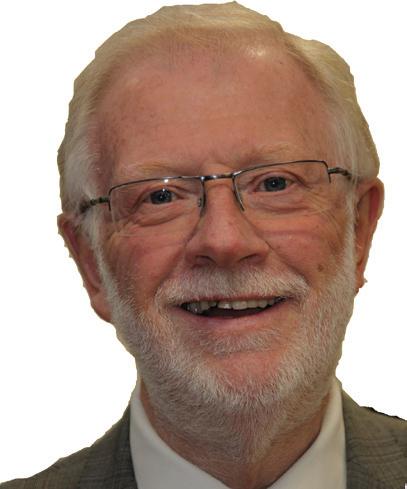
“Mr Harper appears to bring prejudice to his current role”
18 | 10 March 2023 www.passengertransport.co.uk COMMENT

COMMENT NICK RICHARDSON

Uprising in Oxford - can buses help?
Oxford is experimenting with ways of reducing traffic, and as recent high profile protests have shown, not everyone agrees
Oxford has achieved much in transport terms and is now keen to try further measures to reduce car use in favour of sustainable transport. However, a great deal of noise has erupted regarding proposals to promote low traffic neighbourhoods (LTNs) and the 20-minute neighbourhood concept. With global interest and some very strong views being expressed, some of the key issues are being overlooked.
Progress and challenge
Let’s start at the beginning: Oxford’s city centre was once full of buses with most people forming the view that there were far too many of them and they didn’t make a positive contribution to the environment. Since then, bus gates have been introduced that prevent all traffic except buses and selected other vehicles accessing the main thoroughfares, and many bus services have been re-routed. Given the constraints of a historic city centre and the large number of visitors, it is fair to say that there have been significant benefits. Other measures have included replacing the collection of confusing traffic signal junctions, bus stops, cycleways etc outside the rail station with a calm, well-designed public realm that retains space for traffic and people walking and cycling in a well-planned and visually beneficial way. Meanwhile, the park and ride offer has been widened.
However, beyond the city centre, an apparent battleground has emerged
following the emergence of proposals for two initiatives which have become conflated in the minds of many locals and commentators from far beyond. The first is Low Traffic Neighbourhoods (LTNs), essentially restricting vehicle access to selected streets to favour walking and cycling rather than through traffic. All roads remain accessible but alternative routes may be necessary to avoid those where restrictions are in place, generally involving use of the bypass. This is what bypasses are for and local residents don’t appreciate the high volumes of traffic that are using their streets as short cuts. However, this has been contentious and some of the physical measures used to prevent traffic have been vandalised to a point where bigger and more permanent features have had to be installed. There are two ways of viewing LTNs, either as an infringement of motorists’ rights to drive wherever they want or as a way of creating streets that are safer and easier for locals.
The other proposal is to promote the 15-minute neighbourhood concept in which local people should be able to reach all the local facilities they need within 15 minutes by sustainable means, here extended to 20 minutes. As with LTNs, this is to challenge
traffic levels and establish communities that offer realistic travel choices without being overshadowed by excessive car use. To enable this, selected locations will prevent car access for through traffic, although residents will be allowed one hundred occasions annually in which they can pass through the filters without a penalty being imposed. This presents generous opportunities for people who walk and cycle in Oxford in huge numbers or use the comprehensive network of local bus services either within or beyond their neighbourhood. This proposal has lit the touch paper of many, following consultation by Oxford City Council and Oxfordshire County Council.
Polarised views
The BBC Radio 4 AntiSocial programme of February 17 hosted a heated debate with both sides of the argument putting their case. This was helpful in separating realities from misconceptions and certainly provided a shop window for the angry. What was clear was that the protest movement was deeply entrenched and networked with similar protests in urban areas across the country and beyond. What was also clear was that the proposals had been widely misunderstood.
To provide some clarity in between the acrimony, the objectives of the proposals need to be reiterated - traffic in Oxford has been a problem for years and needs to be addressed. This means doing something about unrestrained car use when a range of other local travel options are available. Oxford is of a size that many journeys could be walked or certainly cycled with a very strong cycle culture evident. It is also a major attractor for visitors and for students of the various learning establishments. Quite rightly, the city is looking to enact government policies regarding improved air quality, carbon reduction and so on which involves reducing the number and length of car journeys. What is abundantly clear is that letting increasing numbers of people drive wherever and whenever they like creates traffic congestiona situation that has persisted for decades - and change is necessary. This then takes us to the debate about how this could be achieved.
Asking people nicely to change their travel behaviour has only a limited effect. Despite having plenty of bus services available, there
20 | 10 March 2023 www.passengertransport.co.uk
“Let’s hope that sensible debate can be extracted from all the nonsense”
is a widespread reluctance among habitual car users to use them for a multitude of reasons involving working times, the location of schools, shopping needs, leisure activities and so on. Coupled with this is an apparent freedom, that of driving everywhere regardless of the consequences for everyone else. In normal circumstances, this could provide the basis for a meaningful discussion of how to best address key objectives. Instead Oxford has witnessed how fast miscommunication can spread which would be funny if it wasn’t such a serious issue. One ‘influencer’ was particularly emotive about people not being allowed to leave their houses without permission from the council and there have been endless stories about how people will be trapped in their neighbourhoods. Infringing liberty has been
postulated to Orwellian levels with talk of people being prevented from going about their daily business by an undemocratic process. Exploring this in a bit more detail may help explain the hysteria.
Public consultation on transport schemes is not a referendum on whether or not people like something. It there was a plebiscite about every council decision, nothing would ever get it done. Local councils are elected, regardless of whether or not people turn out to vote one way or another; this is democracy. Councillors are elected to make decisions on behalf of their communities. If people make their views known at a consultation event, that’s fine but it is not about the shouty ones winning the argument. When this is fuelled by hate it all turns rather nasty. If local people don’t like
something, they have a democratic right to vote for someone who better represents them, or indeed to stand for election themselves.
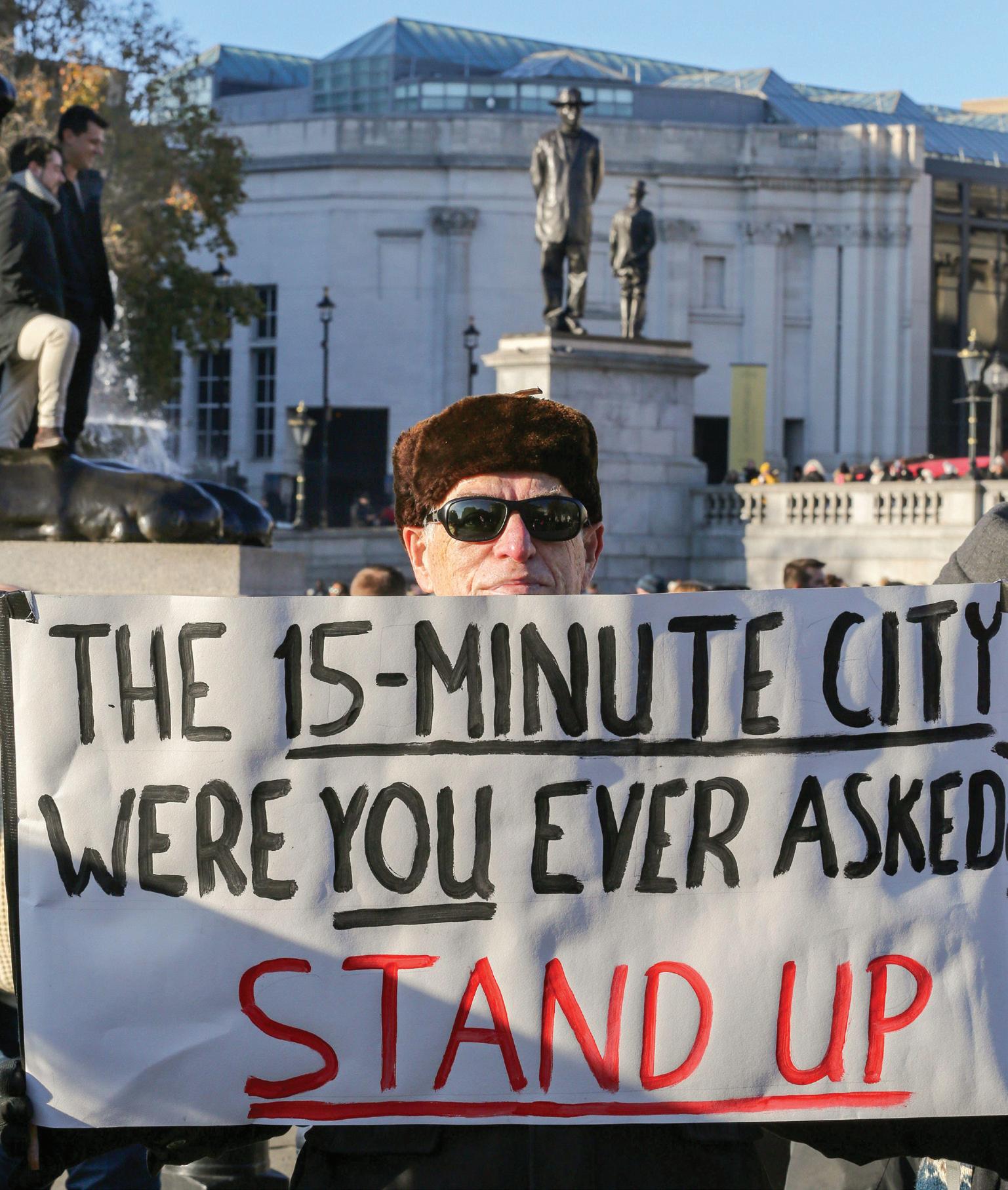
Regrettably the scourge of social media passing on nonsense seems to chime with many people who view traffic measures in Oxford as part of a wider conspiracy that created Covid-19 to subjugate ordinary people while global businesses determine the world order. All these opinions were aired on the Radio 4 programme and whether or not they influence populist views, they are far removed from the debate about traffic restrictions in suburban Oxford.

Finding solutions
This reinforces two common problems: transport is an emotive issue and everyone thinks they are an expert. It also shows how muddied the waters can become when considering people movement rather than car movement. Neither of the initiatives stops anyone going anywhere because there are bus and other options available, but they do contain vehicle movements. Being excited about initiatives that make local transport better would be a good thing but car users breaking down street furniture and using residential streets as short cuts is not a solution. Oxford has been trying to deal with this and no solution has yet appeared out of thin air to enable everyone to carry on driving everywhere. Allied to this is the view of transport adopted by individuals that reflects their own aspirations. For many this means crossing the road safely to get to school, to walk to the shops without inhaling exhaust emissions, or a cycle route that doesn’t involve recriminations from car users. It also means getting on a bus that goes where cars cannot and where the bus doesn’t sit in endless traffic queues caused by a series of individuals taking up all the space. Let’s hope that sensible debate can be extracted from all the nonsense.
ABOUT THE AUTHOR
Nick Richardson is Technical Principal at transport consultancy Mott MacDonald, chair of CILT’s Bus and Coach Policy Group and a former chair of the Transport Planning Society. In addition, he has held a PCV licence for over 30 years.
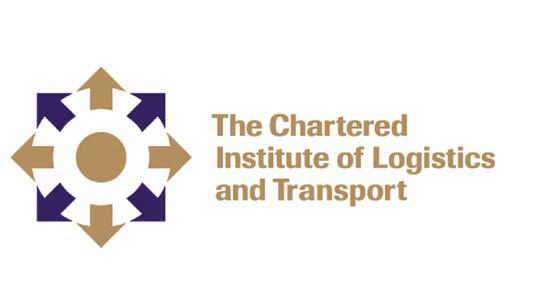
IN ASSOCIATION WITH: www.ciltuk.org.uk Tel: 01536 740100 @ciltuk
Nonsense on social media seems to chime with many people who view traffic measures as part of a wider conspiracy theory
www.passengertransport.co.uk 10 March 2023 | 21
SOPA IMAGES
WOMEN IN PASSENGER TRANSPORT WOMEN IN TRANSPORT
A mission to advance women
Since 2005, Women in Transport has grown from a small group to one that now has 1,200 members
Women in Transport is a non profit with a mission to advance women working in transport - but we’re open to everyone.
In 2005, a small group of passionate volunteers created a safe space for members to network, support their career progression and have some unique experiences. The network started with fewer than 100 women and connection to an American network meant we could only operate within the M25.
In 2017, we made a bold move to become an independent UK network and rebrand to Women in Transport. We felt it was the right thing to do for our members and to enable the network to grow. The volunteer board were open and willing to make some bold decisions and it has led to some incredible results.
At the time, we had just one part-time member of the team and everyone else was a volunteer. I was the volunteer vice president and I led the rebrand project. We had many questions to answer - not least should we be “Women in..”. Our network is and always will be open to all but we do have consciously exclusive programmes that support women working in the transport sector. We also have brilliant advocates and allies who support our work and are members who enjoy being part of the community.
I was appointed as chief executive in 2019. That year, we established our first regional hub and we launched the Women in Transport Diversity and Inclusion Bus Group.
Navigating through the first Covid-19 lockdown, we faced uncertainty with company budgets being frozen. I vividly recall chairing a Zoom call with our members (whilst eight months pregnant) and telling them our future was in serious jeopardy. Our members responded with a call to action which helped us rethink, diversify our income and build a sustainable model to carry us through, stronger and better than ever.
Fast forward to 2023, we now have over 1,200 members nationwide and are working with
more than 50 organisations. We’ve established regional hubs in North East, North West, Scotland, West Midlands, Yorkshire and Wales with plans for more. Our influence and visibility is increasing everyday and we’re reaching over a million people across our social platforms.
We’ve supported over 250 mentees and mentors through our Advance mentoring programme since 2018. Our leadership development programme, Lead, launched in 2021, has a growing alumunae of more than 60 women.
I’m proud of everything we’ve achieved. We are an open and inclusive network. We’re passionate about collaboration and working with other networks, professional institutions and trade bodies which share our passion for creating a more representative, inclusive and sustainable transport sector. Alongside supporting our members, we’re focusing on four key themes from our president’s strategy:
1. Inspiring the next generation;
2. Influencing industry to decarbonise;
3. Supporting women’s safety;
4. Challenging gender and cultural barriers. This year, we will also be launching an exciting new project to bring together the whole of the transport industry in a groundbreaking piece of work which will provide baseline data to measure and track progress on equity across transport as a whole.
I’m really excited for the future of Women in Transport. It feels like the transport sector is ready to take action and committed to making the future of the transport workforce more representative and inclusive, and we’re at the forefront of driving that change.
If you would like to be part of the change then join us at www.womenintransport.com.
ABOUT THE AUTHOR
Sonya Byers is chief executive of Women in Transport, a non-profit network which supports the professional development of women working in the transport sector.


WOMEN IN TRANSPORT IS A FORCE FOR CHANGE
On issues such as women’s safety, we bring our unique perspectives
Women in Transport is a force for change and that’s why we’re focusing on four key themes that are important to our members, in addition to our core mission of advancing women.
On issues such as women’s safety, we bring our unique perspectives as transport professionals and users of the network to help the industry solve its challenges and make transport safer for everyone.
Cross-party political support is vital to delivering the changes we want to see in relation to our key themes and we’re pleased to have the continued support of the All-Party Parliamentary Group (APPG) for Women in Transport, Chaired by Ruth Cadbury MP.
We’ll continue to work with the APPG and stakeholders in parliament, governments and the wider industry to ensure our members’ voices are heard.
Sonya Byers
“It feels like the transport sector is ready to take action and committed to making the future of the transport workforce more representative and inclusive”
22 | 10 March 2023 www.passengertransport.co.uk
JO FIELD PRESIDENT, WOMEN IN TRANSPORT COMMENT
We need to widen our perpectives
Deprioritising the perspectives of minority women to a footnote in the story of female gender empowerment can feel stifling
The Interational Women’s Day 2023 campaign theme#EmbraceEquity - seeks to get the world talking about why “equal opportunities are no longer enough” - and can in fact be exclusionary, rather than inclusive. This theme really got me thinking, about what it means for all women including someone like me who has a number of overlapping identities that in my eyes, peacefully co-exist with one another, such as being British, Indian, Female and Muslim.
If we can just think about South-Asian women as an example for one moment, it is important to recognise that we aren’t just one homogenous group. We all have different faith and beliefs, languages, and cultural traditions, interwoven with varying issues of class and caste privilege. There are a number of stereotypes and tropes we have been reduced to, thanks to the orientalisation of Asian women such as being passive, docile and quiet. More recently new stereotypes have been added to our list of labels, including bombers or bashful brides. The experiences and stereotypes South-Asian women must contend with is unique compared to our white and black colleagues. Furthermore, while incidents of blatant racism and sexism might be deterred by zero-tolerance policies in the workforce, microaggressions still plague the daily interactions of many minority women.
Comments run deep
Microaggressions are just one piece of a systemically problematic machine. Imagine a microaggression as a tiny paper cut. When it first happens, it stings but you won’t bleed to death. But imagine getting ten paper cuts a day, your hands would really start to feel hurt. By the tenth paper cut, you’d be fuming. Imagine then when you start talking about your pain, you are gaslit and told ‘come on it’s
only a paper cut’. Little can they see you are covered in them. The perceived smallness of the action can make microaggressions all the more sinister. But there is nothing micro about microaggressions. They creep into the workplace and into society in general. Like many of the buzzwords that have surfaced in recent years, the true meaning of microaggressions gets diluted or worse still ignored completely. But that doesn’t erase how truly harmful they are. All these paper cuts are eroding minority women’s mental health, job performance, career progression and the quality of our social experience. Micro-intervention training is an example of an equitable based solution to counteract this form of discrimination. The first rule of effective intervention is being able to see beyond the obvious, read between the lines and decipher the double meanings of microaggressions. This has been proven successful in helping white allies to recognise prejudicial and discriminatory actions in the workplace and challenge them. For our workplace to become happier, healthier, and safer places for minority women, we desperately need a shift in resources
away from exclusionary zero tolerance policies and towards inclusive empathybased programmes. Studies overwhelmingly show that bias training is really great in raising awareness but fails to actually change behaviours. This can also be where the use of virtual reality training comes in. Being able to put ourselves in the shoes of someone who is unlike us, may provide us with a level of understanding about their situation that can be very powerful. Immersive technologies have proven successful in industries that are heavily skewed towards one demographic - just like the rail industry. Activating a universal value like empathy allows individuals to truly utilise their rational and emotional brain, reflect and consider a broader perspective and adjust the lenses through which they tackle their day to day lives, but also build a deeper level of understanding with colleagues, clients and customers alike. It turns awareness into engagement and then ultimately action.
I would ask everyone reading this to please widen your perspectives when it comes to gender-based solutions and not ignore racialised elements to this. I do think as an industry we have matured enough to question the utility of all-male panels, but I would ask us to please put the same energy into scrutinising all-white panels. Having others tell our own stories for us, an overreliance of stereotypes or even deprioritising the perspectives of minority women to a mere footnote in the overall story of female gender empowerment, can feel stifling - almost like a form of intellectual colonialism.
For this international women’s day, let’s all come together. Let’s take the time to listen to each other’s experiences, and truths, hear each other from our own voices and create equitable based solutions. The way we experience the world may be different, but we all want the same things: to be respected, valued and safe at work and beyond. This is what #EmbracingEquity means to me.
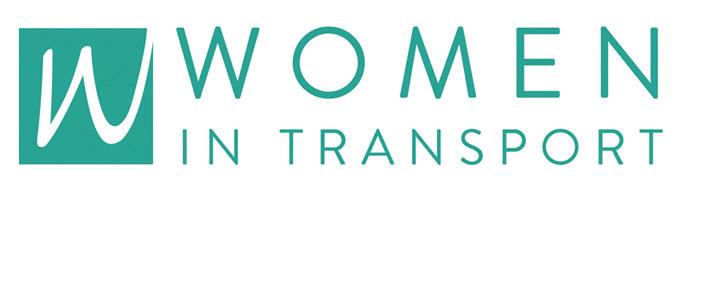
ABOUT THE AUTHOR

Nafisa Nathani is Southern Region Lead for Cultural Fusion, Network Rail’s race equality network. Cultural Fusion is open to all those who work in the rail sector. To join, email culturalfusion@networkrail.co.uk


IN ASSOCIATION WITH Women in Transport womenintransport.com @transportwm
Nafisa Nathani
www.passengertransport.co.uk 10 March 2023 | 23
Rezwana Khanom is training to become a driver with Southern
Coming together to ‘get things moving’
Women in Transport’s Diversity & Inclusion Bus Group continues to grow - and so does its solid progress in making change happen
Let’s go back to 2019, to this very publication, Passenger Transport, when I wrote an article entitled ‘Let’s talk about women and buses’ (PT201), an honest account of my personal experiences of being a woman, working in the bus industry. It wasn’t simply about being a woman, it was also about the need for a strong inclusive culture, looking at ways to tackle unconscious bias, and opening channels of communication, so that more of us felt comfortable to come together and share experiences and speak openly to really start to make a difference.
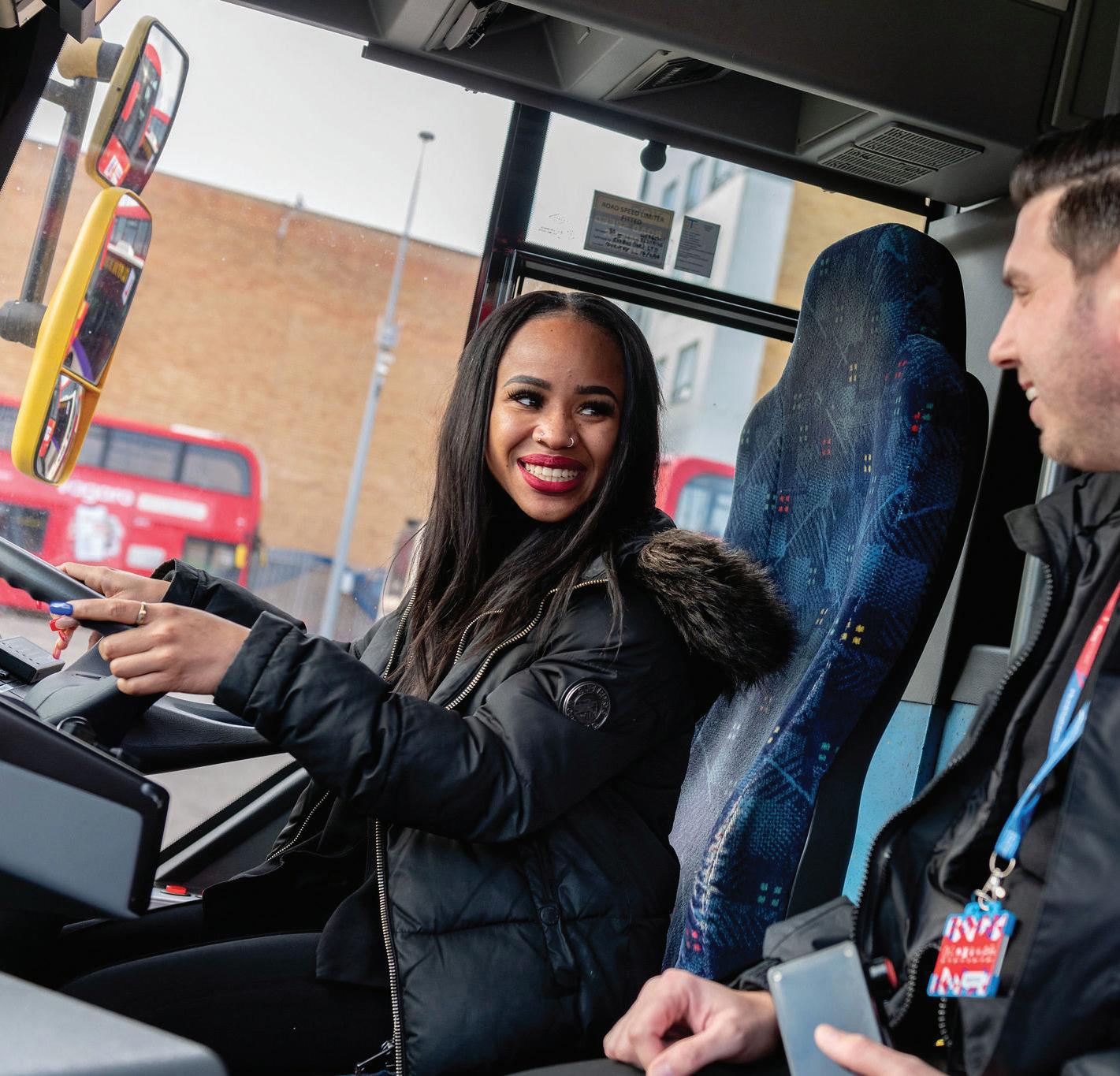
With a positive mind set for change, the article ended with a rather optimistic rallying cry: “If you’re interested in joining a group that will aim to accelerate and influence the gender diversity agenda within the bus industry, please do get in touch. Let’s all come together and get things truly moving.”
And people did come together. They really did want to “get things truly moving”!
After a mutual colleague read the article and made a brief introduction on Twitter (proving in this instance that it can be a platform for good!) I was put in touch with the amazing Sonya Byers, CEO of Women in Transport.

We set up a meeting to discuss ‘women in bus’, and it was evident that my article had created a buzz among fellow industry professionals and therefore the natural progression for this new network was its integration into the already established and hugely successful Women in Transport.
Fast forward nearly four years and we are now a diverse group of 35 active members across 19 different organisations. Our members represent all the main bus groups, bus manufacturers, from managing directors, operation managers, innovation leads, diversity and inclusion officers, through to software developers and everything in between. We are all proudly part of Women in Transport, and just like Women in Transport the group is a universal collective open to all. To put it simply we’re like-minded individuals with the same mission, a dedication to promoting diversity and inclusion - something we’re very proud of. We’re a great mix of people which gives our discussions a really balanced feel.
In ground-breaking research carried out by Women in Transport as part of their role as secretariat to the All-Party Parliamentary Group (APPG) in 2021, it became apparent that we were missing the complete picture. The research involved a survey and it was clear from the feedback that there were very few men coming forward, willing to share on this subject. The survey was looking into women’s experiences and perceptions of working in the transport industry and it seemed their male counterparts felt they were unqualified to comment on the subject matter. In contrast to these beliefs we know it’s the complete opposite, in order to build a stronger future for our industry we need everyone’s experiences. We are really proud of having such strong male representation in the Diversity and Inclusion Bus Group.
It really feels as if we are moving forward in a way we haven’t seen before. The topic of diversity and inclusion has in recent years been prioritised across the bus industry through much talk and discussion. However, proactive change has always seemed a very slow process. That wasn’t the case until the last few years.
Go-Ahead London is doing excellent work with its apprenticeships. Pictured: trainee driver Chelsea Dash
WOMEN IN PASSENGER
DIVERSITY
24 | 10 March 2023 www.passengertransport.co.uk
“It really feels as if we are moving forward in a way we haven’t seen before”
TRANSPORT
& INCLUSION BUS
GROUP
Chloe LeachO’Connell
We actually have the pandemic to thank for re-focusing our organisations on their commitment to recruitment and retention in order to tackle one of the biggest challenges we have ever faced as an industry. This side of the business has never seen such intense scrutiny and there’s been a shift change in the resource that’s invested in these areas. One of the most encouraging things is that you can genuinely detect this newfound desire from around the industry to do things differently. Diversity and inclusion is now seen as absolutely essential. We can clearly see this in the progress that we are making as a group, and how open the wider industry is in supporting us.
A great example of us moving forward, making the change and achieving our common goal, is our commitment to recruitment and retention in the form of ‘The Inclusive Employment Journey’, one of our main work streams and key outputs from the group in 2022. Both myself and Caroline Ward, another founder member of the Diversity and Inclusion Bus Group, led and implemented this project, supported and hosted by CPT. We have created a central resource for the whole of the bus and coach industry to use and one that will benefit all. The ‘journey’ covers every step of a colleague’s employment within the industry, from community engagement and recruitment, through to their working life and on to support with ‘life after buses’ when our long servers leave the industry. The resource is completely free to use - all you have to do is visit http://www.the-iej.org.uk where you can access best practice case studies, all with diversity and inclusion at their heart.

We see this as an incredibly exciting and innovative project, one which we are eager to build on and grow. It’s our vision for The Inclusive Employment Journey to be the central reference point for all levels of management within the industry to access, enabling them to understand where there are opportunities for improvement. For the ‘journey’ to grow we will need collaboration which will undoubtedly be the key to our success.
This is just the beginning; we know there are pockets of excellence throughout our industry so why wouldn’t we want to shout about them, it’s vitally important that we share these practices. One of our latest additions is GoAhead London’s apprenticeships, a case study showcasing the excellent work they are doing
I’m immensely proud of this incredible group and everything we’ve achieved so far. Its success has been driven by the passion and dedication of Chloe, Caroline and other members in the group who volunteer their invaluable time and skills because they genuinely care about making a difference. Our increased membership provided an opportunity to have more impact and influence. I’m excited to see the 12 month strategy that we’ve co-created come to life to give us new focus and reinforce our key objectives.
to train the next generation of London bus drivers at their award winning, state-of-the-art training academy in Camberwell. Diversity is at its heart; apprentices range from 18 to 65, with two-thirds coming from ethnic minority backgrounds and where one in five are women. The company is on its way to having a workforce that truly reflects the communities it serves, something that we can all learn from.
There are also stages in The Inclusive Employment Journey that can help us create training and give us access to content that’s already been designed and is free to use. This month saw the addition of Department for Transport’s ‘Real Passenger, Real Person’ training which is a ready-made package of training content designed to help make travel inclusive and accessible for everyone across all modes of public transport. I urge people to send us their case studies and to visit The Inclusive Employment Journey for inspiration. All the contact details are on the site.
The Inclusive Employment Journey is a great example of the ethos of the Diversity and Inclusion Bus Group, since inception we have always sought to ensure we have very clear
outputs. We love the idea of building a strong network, sharing experiences of top initiatives; however, we have annual objectives to keep us focused on our key themes - ones that really matter to our members.
As you would now expect recruitment has become our number one priority in 2023 as we look to continue to improve, not just where we recruit from in society but how we make sure people want to join us and stay with us. We believe a big part of this is ensuring we can help lift the profile of bus driving as a career across the UK, but also offer insights and advice on how we can make our depots and workplaces a welcoming environment for all.
The retention piece is huge and when I’m not volunteering my time to help accelerate diversity my full time job is running a fully fledged communications and marketing agency which has helped develop and deliver many recruitment campaigns over the last 18 months. Whenever we are developing these campaigns my first questions are: What is your induction process? Is there a support network? How do you make new starters feel comfortable? What diversity and inclusion training have the trainers undertaken?
When you start to really think about your potential employees there’s so much more we can do to create a successful recruitment campaign in order to become a ‘first choice’ employer. Everything needs to be just right and our discussions in the Diversity and Inclusion Bus Group frequently cover this area.
This may just be the beginning; however we know that our group has a clear goal, a commitment and focus into ongoing improvement, to achieve an even stronger inclusive culture in our fabulous industry that I am so proud to be part of.
As our group continues to grow we’re making solid progress towards making that difference and really making change happen.
ABOUT THE AUTHOR

Chloe Leach-O’Connell is Managing Director of LOC Consultancy, where she helps organisations develop and deliver marketing and communications strategies, as well as innovative employee engagement programmes. She is also Co-chair of Women in Transport’s Diversity & Inclusion Bus Group.

IN ASSOCIATION WITH Women in Transport womenintransport.com
@transportwm
The members genuinely care about making a difference
I’M IMMENSELY PROUD OF THIS GROUP
www.passengertransport.co.uk 10 March 2023 | 25
SONYA BYERS CHIEF EXECUTIVE, WOMEN IN TRANSPORT COMMENT
WOMEN IN PASSENGER TRANSPORT ABELLIO
Supporting women to achieve their goals
Abellio is making a real difference within the industry by helping women to become leaders at every level of the business
On International Women’s Day it is incredibly exciting to celebrate the contribution of women in the history of passenger transport, in particular, the importance of women to London’s iconic buses. Only 50 years ago Jill Viner made headlines as she became the first official female London Transport driver. Since then, the industry has become more diverse; women sit at the heart of dynamic modern operators, transporting millions of customers in safety and comfort every day.
As a proud operator for Transport for London, Abellio has over 800 buses, 51 routes, 2,500 employees and six depots. We are currently one of the smaller operators in London, but our growth and success stems from all of the dedicated and skilled people within our business. Last July, we opened a
brand new depot in Hayes, West London; the building plaque was unveiled by Louise Cheeseman, director of buses for TfL. Women who were integral to the delivery of this outstanding project were represented across every level and element of the business, watching them celebrate success together was a real highlight for me.
In my role as operations director for Abellio, I am incredibly proud that women represent over 30% of our operations management teams, and 50% amongst the senior operations managers. That diversity brings so much to depot life but also thought leadership and in the different approaches, ideas, and initiatives that we benefit from day to day.
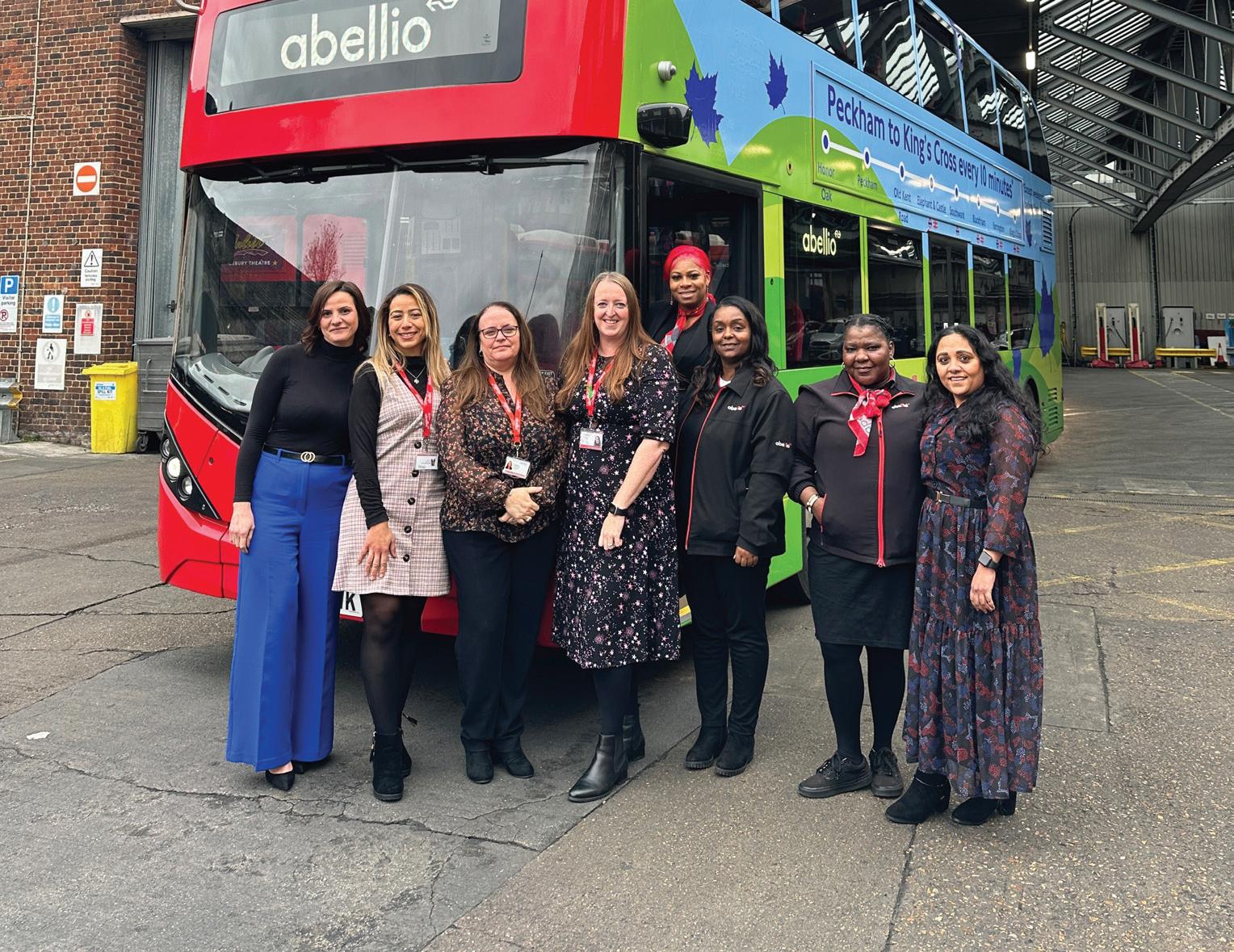
Having started my career as a graduate trainee with National Express and gaining my licence, I worked across a variety of roles and businesses within the group. In 2009, I moved across to Abellio as an operations manager.
When I first started out there were just 4% female employees, and it is hugely encouraging to see this growth in representation to nearly 12% today. But there’s clearly still a huge amount to do within the industry - improving facilities, shift patterns, and breaking down the (largely psychological) block around driving a large vehicle and more.
One of the reasons I was attracted to the industry was because of the clear people focus I saw demonstrated right from the start of the recruitment process. We really are in the people business, not the bus business. Abellio and the industry as a whole is a fantastic place to work, surrounded by a huge variety of people from every walk of life. You get to do things and meet people you really wouldn’t elsewhere, and I thoroughly recommend this industry to everyone.
Abellio makes a real difference within the industry by supporting women to achieve their goals within their roles and to become leaders at every level of the business. I think that’s especially important in bus as it’s perceived as a traditionally male environment; people need to see role models in all positions to challenge that view and make the industry as a whole more accessible.
Together, as a business we have achieved so much; our spirit of collaboration and diversity has created a solid foundation for an aspirational future. We have an ambitious vision for the future of transport that will see us support TfL to provide cleaner and greener journeys that benefit all Londoners. Abellio is leading the way on introducing state-of-the-art electric infrastructure across our depots and implementing zero emission electric vehicles across many of our routes. By the end of this year over 70% of our fleet will be fully EV or hybrid and there is so much more to come.
I am so proud to lead diverse and collaborative teams that are supported at all levels to succeed. I am confident that together we will achieve our goals and leave a legacy of sustainability and inclusion.
ABOUT THE AUTHOR
Lorna Murphy started her career with National Express before moving to Abellio London Bus in 2009. She is now the company’s operations director.
 Lorna Murphy
Women represent over 30% of Abellio’s operations management teams, and 50% amongst the senior operations managers
Lorna Murphy
Women represent over 30% of Abellio’s operations management teams, and 50% amongst the senior operations managers
26 | 10 March 2023 Brought to you by PassengerTransport
@transportwm




IN ASSOCIATION WITH Women in Transport womenintransport.com
www.passengertransport.co.uk 10 March 2023 | 27
OIL MARKET REPORT £
Exxon reveals $56bn profit for 2022
US president blasts oil major’s ‘outrageous’ $1bn a week return for hugely successful company that has become a societal ‘bogeyman’
February saw a slew of eye-watering annual results from the oil industry and none of them brought more water to the eye than Exxon’s 2022 profit of $56bn. The world’s largest independent (ie, not state- owned) oil company and allround environmental malefactor generated a return of over $1bn per week, $150m a day or a cool $6.5m per hour! Unsurprisingly, shareholders were (quietly) delighted, whilst environmentalists were aghast. Even President ‘Green Deal’ Biden joined the fray, calling the results “outrageous” before then performing the most extraordinary political gymnastics by demanding that Exxon pump more oil out the ground to bring prices down!
Like most American oil giants, Exxon can trace its roots back to the 1870s and John Rockefeller’s Standard Oil Company. Standard was broken up in 1910 by “trust busting” (anti-monopoly) legislation and this led to the creation of seven new oil firms of which Exxon went on to become the biggest. Over the course of the 20th Century, this company relentlessly acquired drilling rights and global exploration licences, whilst building and investing in worldclass refineries with huge production capacities. Exxon heralded themselves as the industry’s low-cost leader, with mega-scale assets so efficiently run that they would be immune to downturns in commodity prices. Even today, they still lead the pack not only with their huge
profits, but also their continued discoveries of new, drillable oil fields.
Exxon’s “boom and bust” defying returns have largely set them apart from other oil majors, along with their steadfast refusal to engage in the decarbonisation agenda. Such faddish interests were left to their less successful and ‘woke’ European competitors. Besides, according to the Exxon board, the company could legitimately claim to already be the most efficient and thus greenest oil company on the planet. Their production facilities flared less waste gas than their rivals, they received far fewer environmental compliance penalties and their refineries were bywords for sustainability in the recycling of energy and waste products. Which is all well and good, but for anyone outside the industry, Exxon simply represent everything that is bad about the oil sector. Despite being one of the first companies to actually prove fossil fuel combustion affected global weather patterns, Exxon chose to bury this evidence and instead mounted an aggressive “climate denial” strategy (involving hundreds of lucratively paid lobbyists and dubiously paid scientists). Their position on climate change was neatly summed up by the then CEO Rex Tillerson in 2012, when he said
“there are much more pressing priorities that we as a society need to deal with and you’d save millions upon millions of lives by making fossil fuels more available”. He then added “it’s an engineering problem and there will be an engineering solution...”.
Inevitably, investors and shareholders turned a blind eye, as long as results were good - which they invariably were. It’s true that in a Covid affected 2020, the company lost $22bn and this generated searching questions about Exxon’s future. What was the point of endlessly extracting crude in a decarbonising world? Surely their huge oil reserves would become nothing more than “stranded assets” once the world started consuming less fossil fuels. But then two years later, those same assets made $56bn in a single year, which is a pretty powerful advert for continued investment!

Besides, Exxon’s public position is that global oil consumption will continue to increase until 2050, which is in stark contrast to the European oil majors (Shell, BP etc) who are forecasting oil decline from 2030 onwards. This doesn’t mean that Exxon has entirely shut out green activity in recent years. It has invested heavily in fuel cell technology, as well as patenting biofuel manufacture from algae (potentially the greenest of all biofuels). Furthermore, in a highly significant move, it has publicly accepted the inevitability of carbon taxes. Certainly these actions do not herald any kind of ‘Road to Damascus’ moment when it comes to climate change. More likely, they simply show a company hedging their bets against a low carbon future, that may be forced upon them via legislation. A good example of this ‘half-way house’ approach to the environment is Exxon’s enormous carbon capture schemes currently being integrated into their global production facilities.
Understandably these activities will not pacify Exxon’s critics, of which there are many. But ultimately the world’s largest independent oil company is guilty of nothing more than doing capitalism well. It invested, it was meticulous, it mastered the market and 100 years later, it made $56bn in a single year. Its continued denial and obstruction of climate change arguments is undoubtedly a stain on its reputation, but Exxon did nothing illegal and its freedom to be a societal “bogeyman” is its right in a democratic world. It is, after all, a business, not a government.
WANT TO KNOW MORE? Visit Portland’s fuel forum page: portland-analytics.co.uk/fuel-forum
COMMENT
PORTLAND FUEL ANALYTICS - MARCH 2023
James Spencer Portland
28 | 10 March 2023 www.passengertransport.co.uk
“It invested, it was meticulous, it mastered the market”
GREAT MINSTER GRUMBLES

What will Labour’s missions mean?
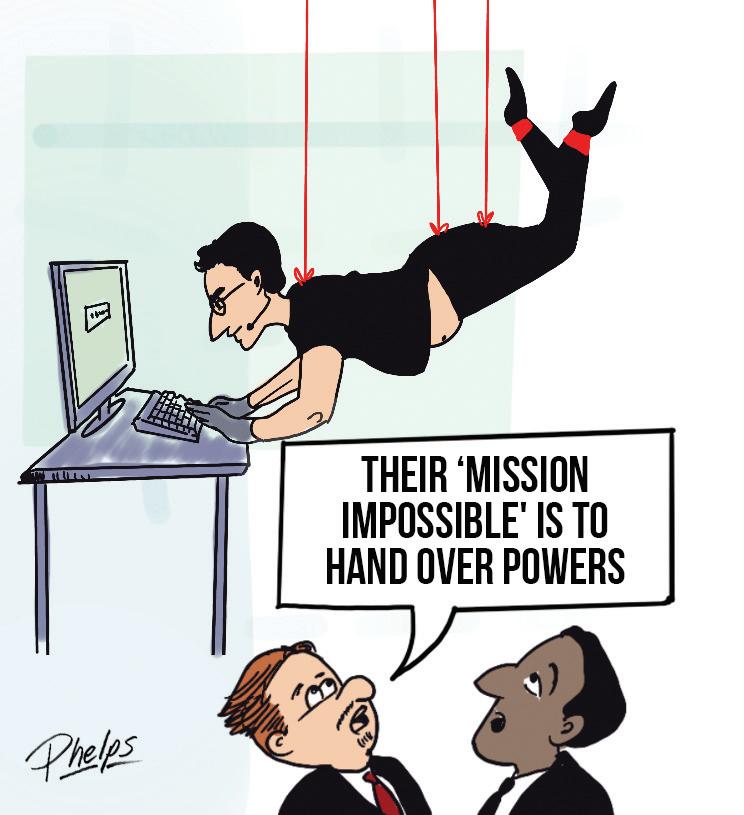
With so much uncertainty hanging over the bus and rail sector right now, I did wonder whether the Abellio UK management team would find a face-saving way to pull out of its planned buy-out of Nederlandse Spoorwegen’s UK operations. But no, the buy-out has been finalised and the new company - Transport UK Group Ltd - is now the proud owner of four rail franchises and some 60 bus routes in and around London.
I can’t help but feel that the management team has taken a big gamble especially on the rail side with the real prospect of an incoming Labour government slowly taking back control of rail franchises as current contracts expire. It may be less exposed in the bus market given its main presence is in the regulated London market, but I wonder what scope there is to really grow the bus business unless we see swathes of authorities outside London go down the franchise route. Nonetheless, I am sure we all wish Dominic Booth and his team the very best.
As I say, there is a real prospect that the Labour Party is going to form the next government, with a general election apparently now expected in the autumn of 2024. That may be a long way off in political terms and doubtless a lot can and will happen between now and then, and Labour’s commanding lead in the polls may yet narrow. But a Labour government come the end of 2024 looks increasingly likely, so perhaps we need to be paying increasingly more attention to what
Labour’s frontbench team are saying, and what Sir Keir Starmer is saying in particular. The Labour leader recently gave a speech setting out his plans for a “mission-driven government” should he win the election and enter No 10 Downing Street. While the speech was high on rhetoric and thin on detail, the Labour Party published a short briefing paper which sought to put just a tiny bit of flesh on the bones. There will, apparently, be five “missions” none of which are specific to transport, or indeed to any particular policy portfolio, but they will apply across Whitehall and, it seems, the approach that Labour will take in government - assuming, of course, you believe that the five “missions” will stand the test once Labour is in power.
There are two “missions” that especially caught my eye when I read Labour’s briefing note. The first is to “devolve decision-making away from Westminster to those with experience, knowledge and expertise” with the suggestion that a Labour government would hand powers to local leaders, and not leave “everything to decision-makers in Whitehall”. I’ve lost count of the number of times prime ministers and leaders of the opposition have vowed to devolve power to local leaders. It never happens, or at least not in the way or to the extent that is suggested. Once MPs and frontbench team find themselves holding ministerial office the reality is they can’t give up the reins of power.
What I also found interesting about this is that if Starmer really is serious about handing powers to local leaders, he is going to have to be very clear on what those powers are, and the implication must surely be that we will need to slim down Whitehall, perhaps even have fewer departments and certainly have far few cabinet and junior ministers. There’s no point devolving power to local leaders if Whitehall remains the same size and we have the same number of ministers. Starmer may find that his power of patronage is much reduced and that he will have many disappointed MPs on his backbenches as a result. Something tells me that this particular mission may not see the light of day in quite the way that is currently suggested!
The other ‘mission’ that caught my eye was to “approach problems with a long-term, preventative approach” which apparently means “providing long-term, integrated funding settlements to local leaders to provide greater financial certainty for local areas”. I’m struggling to see the Treasury buying into this one and I have a strong hunch that whatever the current shadow chancellor, Rachel Reeves, might say about this today - and presumably she and the entire shadow cabinet has agreed to this - won’t stand the test of time once she is actually the chancellor.
Perhaps I’m getting too cynical. I have no doubt that, today, Starmer and his shadow cabinet really believe in these five “missions”. But when the harsh reality of government hits home once Sir Keir walks through the door of No 10 as prime minister I have a hunch we may find that, for one reason or another, these “missions” rapidly get watered down.
COMMENT
Our Whitehall insider imagines what’s going on inside the minds of the mandarins at Great Minster House, home of the DfT
“Something tells me that this particular mission may not see the light of day”
www.passengertransport.co.uk 10 March 2023 | 29
Retirement beckons for Trentbarton boss
Jeff Counsell steps down after a career spanning 50 years
Jeff Counsell retired from his roles as managing director of Trentbarton and Kinchbus on February 28 after almost half a century in the industry.
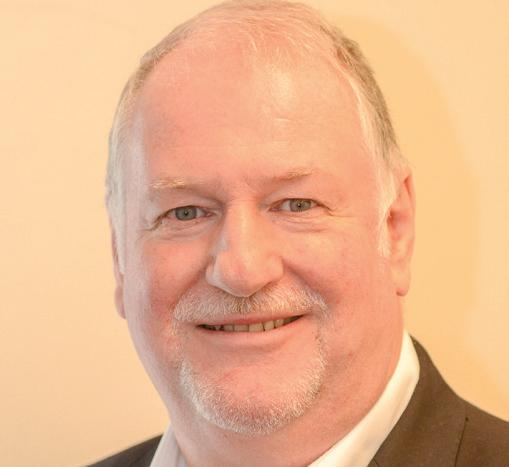

Counsell, who began his career as a 15-year-old apprentice, said: “Retirement is a strange feeling but it’s starting to sink in. I will miss the people terribly. I will miss interacting with our people and with our customers.”
His first job was as an engineering apprentice at Lancashire United Transport in the 1970s. He joined Trentbarton in 1999 as engineering director and progressed to director of service delivery before becoming managing director in 2009.
NEW CHAIR FOR DPTAC
Team GB wheelchair fencer to advise ministers
The Department for Transport has announced the appointment of Matthew Campbell-Hill, a tech regulation expert and former Team GB wheelchair fencer, as chair of DPTAC, the Disabled Persons Transport Advisory Committee, Building on the work of previous DPTAC chair, Keith Richards, who held the role for over eight years, the government has said Campbell-Hill will provide an independent, expert voice tasked with holding the government to account in ensuring disabled people can travel safely and independently across all modes of transport.
“The last three years have been hard for so many people and for the bus industry,” he admitted. “Covid and its aftermath kept me very busy but away from the parts of the job I love the most - being out and about with our people at depots, bus stations and on board.”
Counsell said the bus industry is a small community and although there are tens of thousands of
buses in the UK, “everybody knows each other”.
He continued: “I’m still in contact with people I worked with in the 1970s and those connections run deep across the industry. Bus operators are nothing without their people and that’s been central to running Trentbarton. I leave very optimistic that public transport has a great future.”
Brian King, chair of Trentbarton parent company Wellglade, paid tribute to Counsell.
Aaron Hill
NEW DIRECTOR OF CPT CYMRU ANNOUNCED
Jeff Counsell
“Jeff can be very proud of the many awards and accolades won by Trentbarton during his tenure and also by the high esteem he is held in by so many in the UK bus industry and in the business community.” he said “We’re all the better for having worked with Jeff.”
Colson quits role as Bus Users UK chair
Departure follows pivotal time for registered charity
Ben Colson has stepped down as chair of Bus Users UK after five and a half years in the role. The former industry manager joined the charity in 2018 following an illustrious career in the bus industry.

Bus Users UK said Colson had been pivotal in transforming the organisation into a registered charity and the only Approved Alternative Dispute Resolution body for the bus and coach industry. Under his governance,
Ben Colson
Bus Users UK is now recognised by government and transport bodies as a champion of accessible transport.
Claire Walters, chief executive of Bus Users, described Colson as “an exemplary chair”.
The Confederation of Passenger Transport has announced Aaron Hill as its new director of CPT Cymru.
CPT said Hill brings a wealth of experience from membership organisations and the third sector, having an extensive background in policy, influencing and external affairs. His previous roles have covered a wide variety of public services, including housing, regeneration, health and education.
Commenting on his appointment, Hill added: “I’m really excited to meet our members and get stuck into the policy agenda that affects buses and coaches in Wales. There are big questions on funding, Net Zero and upcoming legislative changes. I look forward to championing the role buses and coaches can play in tackling the climate emergency and boosting local economies.”
In previous roles, Hill has been director of policy with the Scottish Federation of Housing Associations and head of policy with Wales-based organisations including Community Housing Cymru and the National Deaf Children’s Society. He is also a board member with a local housing association and was previously chair of Public Affairs Cymru, a membership organisation for public affairs professionals in Wales.
CAREERS 30 | 10 March 2023 www.passengertransport.co.uk
Aaron Hill brings public services policy experience


CALL NOW TO ADVERTISE 020 3950 8000 or email sales@passengertransport.co.uk www.passengertransport.co.uk 10 March 2023 | 31
DIVERSIONS
Luke is a chip off the old bus driving block
Coventry driver follows in his family’s footsteps
A young National Express Coventry trainee has become a driving sensation after passing his bus driving test with no minor faults on his record.
Luke Brown, 18, took to the wheel after taking inspiration from his father Stuart, who is also a driver with the company. After completing his driver training, Luke passed his Passenger Carrying Vehicle (PCV) licence first time. As a result, he’s now a qualified bus driver for

A CHANCE TO SEE A RAILWAY ICON
A two-week ballot has opened for members of the public to get the chance to be on a rare tour of a Birmingham city centre railway landmark.
National Express Coventry.
Commenting on the result, Luke said: “It feels great to have passed with no minors. I put a lot of time and effort into practising for the test so it’s very satisfying to know my hard
work has paid off.
“Having a supportive team around me has helped a lot. During my training, no question was too silly and my instructor was calm and informative so I didn’t feel pressured at all, which I believe has really spurred on my development.”
And what is Luke most looking forward to from his new career?
“I’m looking forward to spending more time on the road, helping more people get around and working alongside my dad, who has worked for the garage for the past 20 years.
“Although, now there is a bit of competition between me and dad for who’s the better driver!”
NEXT STOP: ST PANCAKE
SUBSCRIPTION ORDER FORM
For one day only, Network Rail will open the doors to the Grade II-listed Birmingham New Street power signal box (PSB) after it finished 56 years of duty in December.

A total of 60 places are on offer for five, 45-minute tours starting every hour from midday on March 31. Due to anticipated high demand, tickets will be allocated by a random ballot. It will close on March 17 and then the lucky people who have been successful will be contacted.
“We were overwhelmed by the
response when we announced that the Birmingham power signal box would be closing, so it felt like the right thing to do to open up the doors and show off this local landmark which played a crucial role for six decades at the heart of Britain’s railway network,” said Denise Wetton, Network Rail’s central route director.
And with the Confederation of Passenger Transport’s conference taking place in the city on March 30-31, you well and truly have no excuse not to enter! Details can be found here: bit.ly/3L94OBo.
Train operator Southeastern got into the spirit of Pancake Day (perhaps better known to those of us who grew up watching TV in the 1990s as “P-P-P-P-P-P-P-P Pancake Day”) by once again renaming London St Pancras station London St Pancake, which has become something of a tradition for the train operator.
While many appreciated Southeastern’s social media posts that showed a station display screen announcing a flurry of train departures to destination du jour London St Pancake, the joke fell flat for one or two curmudgeons.
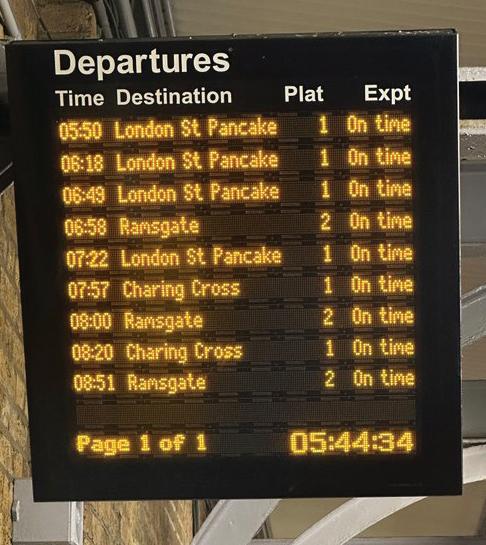
“Only joke there is the ‘on time’,” noted one Twitter user!
SEEN SOMETHING QUIRKY?
Why not drop us a line at editorial@passengertransport.co.uk
All annual subscription rates include delivery by secondclass post, or airmail for overseas. Please note: At present we are unable to provide printed subscriptions to readers based in European Union member countries. ANNUA L SUBSCRIPTION R ATES 1 year UK: £140 Rest of World: £280 2 year UK: £250 3 year UK: £375 WWW.PASSENGERTRANSPORT.CO.UK N A M E JOB TITLE CO M PANY ADDRESS POSTCODE TEL E M AIL DATE PLEASE START MY SUBSCRIPTION TO PASSENGER TRANSPORT CARD NU M BER SECURITY CODE EXPIRY DATE SIGNATURE I enclose a cheque for £ made payable to Passenger Transport Publishing Limited Please invoice my company (official order enclosed) I authorise you to debit my M astercard/VISA/ M aestro/VISA Electron card. Amount £ PT284 Email: subs@passengertransport.co.uk Return to: Subscriptions, Passenger Transport Publishing Ltd, PO Box 5496, Westbury BA13 9BX
Should we toss for it?
Who’s the better driver?
Brutally fun
32 | 10 March 2023 www.passengertransport.co.uk































 Lorna Murphy
Women represent over 30% of Abellio’s operations management teams, and 50% amongst the senior operations managers
Lorna Murphy
Women represent over 30% of Abellio’s operations management teams, and 50% amongst the senior operations managers












